

How to Find a Good Travel Partner (& How to Be One)
Please share if you enjoy this content!
Many people ask me why I enjoy traveling solo, and I have a lot of responses, including that it’s not easy to find a good travel partner. No matter how close of friends you are with someone, it can be difficult to travel together.
This is especially true on an international trip where you don’t speak the local language.
Being a good travel partner isn’t always about compromising, especially if doing so will frustrate you or cause you not to have a good time. It’s about being as considerate of yourself as the person you’re traveling with and ensuring everyone gets most of what they want.
This post includes my thoughts on what makes a good travel companion.

This post may contain affiliate links, which means I’ll receive a commission if you purchase through my links at no extra cost to you. Please read the full disclosure for more information.
1. Reach Agreement Before the Trip
What kind of trip do you expect to go on? Is this going to be a five-star splurge or a bare-bones budget vacation? Are you seeking a relaxing getaway or a jam-packed exploration of a location? City or country?
What is the budget you’re able to spend, and do you both agree? One way to have disagreement and frustration very quickly is if you don’t agree on the kind of vacation you are going on.
Being a good travel partner starts at the beginning of the planning stages. I recommend discussing this when planning the trip to ensure you are on the same page. Then, continue the discussion with the decisions that need to be made.
This dialogue continues until the end of the trip as well. There are a lot of decisions you make while you’re traveling, and it’s important to come to an agreement that you are both ok with.

Areas of Potential Friction
Even amongst the best of friends, you can have very different views about your vacation and your expectations during it. When you start planning your trip, keep these things in mind and discuss any issues throughout.
- Total budget : It’s important to determine an approximate budget before you travel to ensure you’re on the same page about accommodation and activities.
- Priorities : Is cost the driving factor in your decisions or experience? Do you want to be active, see certain things, and connect with people? Knowing your own priorities and those of your travel partner is key to agreeing.
- Where to stay/accommodation : discuss your ideal place to stay before you book, along with your budget. Do you want a hotel or an apartment? Separate bedrooms? What amenities are important?
- Activities : What are the things you most want to do on this trip? Do you enjoy being active, like hiking or biking, or are you more interested in sitting in cafes and watching the world go by?
- Early or late start : Are you more of a morning person or a night owl? Do you take forever to get ready in the morning, or are you in for a quick shower, then you want to dash out the door?
- Downtime : Do you like to go for 12-hour stretches or take breaks during the day, either when you’re out and about or going back to the room to rest?
- Alone time : Are you used to being with someone 24/7, or do you need some “me time.” What does that look like to you: reading a book in quiet, separate rooms, solo time?
- Dining/types of cuisine : Besides the budget, what type of restaurants do you enjoy eating in? Take out, sit down, street vendors? Do you want to dress up or go casual? Local and ethnic or American-style food (or that of your country).
What to Do When You Disagree
You don’t want to get up before 8 a.m., and your travel partner wants to be up and out by then. Or you have simple needs and want to stay at budget accommodation in a safe area, but your travel buddy has loftier expectations.
Take the time to talk through these things and work towards a compromise you can both be happy with.
When I went to Italy, I had a day when I was feeling exhausted. My friend wanted to go to a market, but I was not up for all of the hustle and bustle.
Instead of trying to talk her out of it or her trying to talk me into it, I encouraged her to go and enjoy herself while I took a nap. I was nice and rested when she returned, eager to get back out there to see more.
Alternatively, we could have agreed to go to the market on a different day and do something more chill instead.
Don’t be afraid to do your own thing for a while if something is significant to you. Or if there’s something your friend wants to do that you don’t, maybe you can offer to do something he wants to do for him to come with you for what’s important to you.
Compromise and being considerate of each other are what it’s all about.
2. Share Responsibility and Effort
A lot of work goes into planning a trip, before the trip and during. Vacations are fun, but a lot of work goes into making it that way unless you go on a guided trip where everything is planned for you.
There is research to do before you go, bookings to be made, and decisions to be made before and during the trip. It’s a good idea to expect to share those responsibilities to have a good time on the trip.
Several people I have traveled with assumed that since I travel so much, I love to do all the work. The truth is that I enjoy going on great trips, and I’m willing to do the work needed to achieve the result I want.
So, if you’re not offering to help with the research, then offer to do something else.
Some Examples
For example, on a recent trip I took with a friend to Alaska, I did most of the research before the trip. She did all of the driving.
I was over the moon as I hadn’t driven on the snow and ice for many years and was a little concerned, especially at night (I am NOT a night owl). She took that worry from me, so we both felt it was a great share of work.
Alternatively, I went on a trip to Costa Rica with a friend, which was the opposite experience. I planned everything before the trip and even heard her tell someone that she let me because I love doing it (she never asked if that was the case).
Then, I had to make every decision during the trip. This included when to go places, where to eat, and research restaurants. I tried to go for a walk to get some “me” time, and she insisted on going.
Needless to say, it was a very frustrating trip and not a fun experience for me at all.
3. Talk About Splitting Costs
Talk about how you plan to split costs during your trip before you leave. Do you plan to alternate meals or split the bills? Will you get the rental car, and the other get meals?
Or will one person pay for everything, and the other will pay after the trip? However you do it, make sure you agree and both feel comfortable.
4. Have Patience
Traveling can be stressful, particularly internationally, when you don’t speak the local language. Patience certainly is not one of my virtues, but when traveling, you have to dig deep to find it where you don’t know you have it.
I remember on my first trip to Asia, after a painfully long and sleepless flight, we arrived at a ridiculously crowded airport. I don’t recall what set my friend off, but it was about figuring out where we had to go.
He had a bit of a meltdown at the airport. That was ok—I was on it. I suggested he sit down and watch our bags, and I’d head out to figure things out.
It could have escalated to an argument since we were exhausted and cranky, but it didn’t. Don’t worry; I paid him back later in the trip with my meltdown.
He was equally patient with me and cared while I cooled off. Travel is all about teamwork when you travel with others.
5. Consideration and Compromise
No matter how close of friends you may be with your travel companion, you will have differences of opinion on things during the trip. How you handle it is essential to make for a great time on vacation.
Do you want to see something your friend doesn’t? Or does your travel partner want to stay in, but you want to go out? Take turns with the decision-making; remember, it’s ok to do things independently.
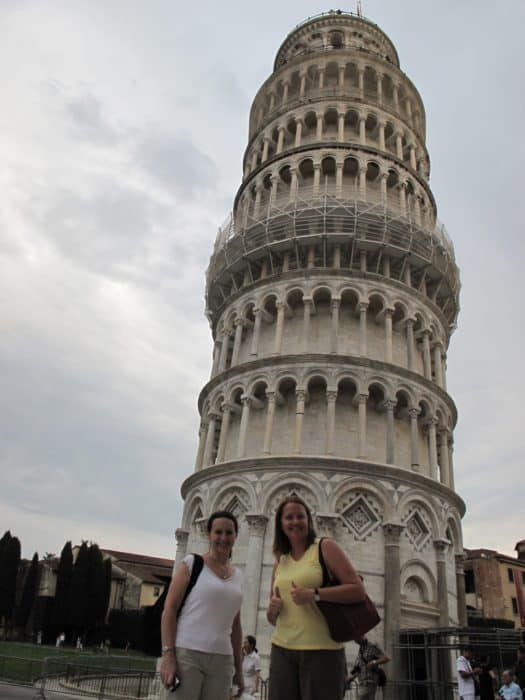
6. Communication Before & During the Trip
It is crucial that you express your needs and wants during a trip. Of course, this is important at any time in any relationship. When you are traveling with a person, it’s essential.
Say what you want or what you need, and listen when the other person does the same. Although you may be friends, hanging out together and living together, even for a week or two, is very different.
Ask questions instead of assuming. Is your friend in a bad mood or angry with you? Ask the question so you can handle it so it doesn’t fester on the trip. I didn’t heed this advice once, and it strained a friendship.
I got angry and didn’t want to start a fight, so I didn’t talk to my travel partner for a couple of days on the trip. Talk about uncomfortable and awkward! It’s a shame, too, as we had a good time before then.
How to Find a Good Travel Partner
Finding a travel buddy can be challenging, and finding a good one is even more challenging. Before you consider joining a person on a trip, it’s essential to consider your wants and expectations.
Talk about them with your potential travel partner to see if you align. When you get frustrated, as you invariably may at some point in the trip, step back and consider if you are a good travel partner.
Think about how you can open a dialogue to work through the issue so you can continue to have fun.
You Might Also Like
- How I Plan My Trip to Travel Internationally
- 11 of the Best Tips for Travel: What I Wish I Knew Earlier
- 10 of the Best Reasons for Traveling
Like it? Pin it!

Sam is a travel-obsessed animal lover on a quest to create a life of travel with her dog. She loves learning new things, snuggling a dog, architecture, hiking, and bold red wine. Join her in creating a life to dream about!
So you’ve traveled with your cousin a few times…how is he as a travel partner? I am thinking he is one of the easiest people to travel with. ????
I’ll let you know the next time we travel together! 😉
Leave a Reply Cancel reply
Your email address will not be published. Required fields are marked *
AFFILIATE NOTICE
This website uses affiliate links, meaning I may earn a commission if you make a purchase through a link. As an Amazon Associate, I earn from qualifying purchases. Learn more .
- Exciting destinations
- Solo travel
- Travel Tips
- Travel Guides & Itineraries
- Traveling with Pets
- Work with me
Solo Traveler
Solo travel tips, destinations, stories... the source for those who travel alone.
How to Find a Travel Companion: Safe Options and Some to Avoid
February 20, 2023 by Janice Waugh

Finding a travel companion can make travel better but it can also make it worse.
There was a lively debate about finding a travel partner on the Solo Travel Society on Facebook.
- The majority of people considered this service counter to solo travel. Karen wrote: “I don't want to connect with anyone, love being solo. “
- Some thought that there was definitely a place for it. Danielle wrote: “when it comes to hiking or camping remotely while solo, that's a little nerve wracking and I'd love to meet up with people who are in the same mindset. “
- Some liked the idea as a means of getting around the single supplement. Mary wrote: “I like the idea of being connected to someone sometimes to avoid that “single-occupancy tax. “
Let's be clear: despite being a solo traveler, I have traveled with companions many times and had good success. It can enhance the travel experience as you discover a new destination through your own cultural lens and that of your new travel companion as well.
Yet, whatever your reason for seeking a travel companion, I suggest you proceed with caution and use the methods below. They are safe and will help increase your chances of making a successful match.
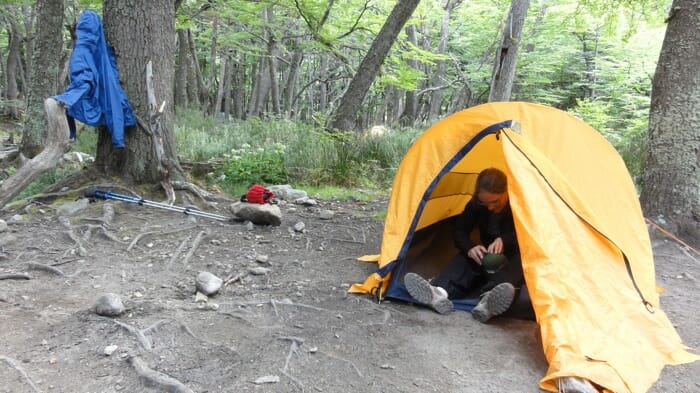
Table of Contents
How to Find a Travel Companion: Methods I Can Recommend
There are safe ways to find a travel partner for a day, a week, or more. These methods give you the freedom of being solo and connecting to interesting people when you want.
1. Get a warm introduction from a friend.
One of the best ways to find a travel companion is through a friend or family member. Being concerned for your safety, they will only suggest that you travel with people they trust. Hopefully, you will be geographically close enough to meet each other a few times before setting out so that you can determine for yourself whether they are a person with whom you'd like to spend a lot of time.
2. How to meet the right travel companion along the way.
This has happened to me most often in hostels, but it doesn't really matter where you meet them. The point is that you meet a travel buddy as you travel, not before. You get to meet them in person and spend a few days together sharing meals or day tours before committing to anything longer. Spend the days in the public sphere and return to your own safe accommodation every night. Eventually, you can decide whether this is the right person for you to travel with.
3. Let your tour/cruise company connect you with a travel partner.
If your goal is to avoid the single supplement on a tour or cruise, ask the travel company to partner you with another solo traveler. Most companies will and, if they can't, they'll give you your own room for no additional charge. See our Deals page for tours and cruises with no or low single supplements.
4. Use Meetup.com to find locals who want similar experiences
Meetup.com is a fabulous resource for solo travelers to meet people of similar interests. These are most often locals, not people to travel with. But, locals! How great is that? I used Meetup.com and found people to hike with in Hong Kong.
5. Book a greeter and have a local share their city with you.
International Greeters connects you with locals who volunteer to show off their city. I've used this service in Paris, New York, Kyoto, and Chicago. It's a great way to meet and have fun with someone new. I've gone cycling, shared lunch, and shopped with greeters.
6. Women Welcome Women World Wide
This is an international community of 2,400 people in over 80 countries. They are mostly women over 60 who want to travel more often and meet locals, so they host one another for a tea or a stay as they travel. Read Women Welcoming Women: A Gateway to International Friendships .
7. Take a day tour or a class to find a travel companion.
If social is what you're looking for, schedule in time for social activities. Day tours and group lessons give you a social experience. Perhaps you'll meet someone with whom you'd like to spend more time. Read How to Travel Alone Without Being Lonely: 10 Tips & 6 Short Stories .
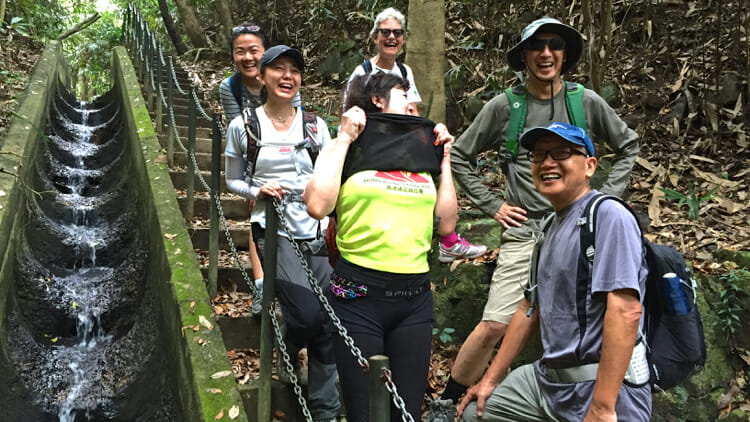
3 Safety Rules for Traveling with Someone New
Traveling with someone you do not know really well requires a few safety tips, especially if you're traveling independently:
- Stay in public. When you are with someone new, stay in the public sphere for at least a few days. You need a bit of time to get to know them before renting a car together or sharing a hotel room. Eventually, determine whether this is a person with whom you truly feel safe.
- Be proactive . Choose who you want to spend time with. Make your own decisions rather than responding to invitations from others who might have agendas of their own.
- Don't be rushed into a decision. If you are considering traveling with someone, don't be rushed into the decision. If the idea comes up but they say that you must decide by a time that is less than comfortable for you, decline the opportunity.
Also, read our primary post on solo travel safety .

Apps/Sites for Travel Companions: My Concerns
There are a number of apps and websites that will help you find a travel partner. I have concerns about them for the following reasons.
- Compatibility . Just because you're going to the same destination does not mean that you're compatible with someone. You may not discover until you're into the trip that you don't share the same interests or ways of exploring, never mind the rhythm of your travels. This can make for a miserable trip.
- Catfishing . A catfish is someone online who pretends to be someone they're not. Without a real life connection, there is no way to know who is real and who isn't on social media. This could put you in a vulnerable situation where the person you thought was going to be your travel buddy is actually expecting to hook up, is not who they pretended to be, or worse.
- Misunderstandings . The potential for a serious misunderstanding is another reason I don't promote the idea of finding a travel partner on an app. Your new travel partner may not have had any intention of deceiving you and may not mean to cause you any harm, yet they may have different hopes for the trip than you do.
- Telling the world you're solo . By participating on an independent matching site and sharing your itinerary you are telling the world that you are traveling solo and where. While I don't hide the fact that I'm solo while I travel, for safety reasons, I don't broadcast it either.
- Sites/apps can get too much personal information . In an effort to increase member safety, some sites go through a variety of verification steps, including gathering government ID information. This raises identity safety concerns.
Because I can't promote the sites that help you find a travel partner (I don't have experience with them), I'm not giving you a list. However, if you are still interested, you will find a list on Google. If you do so, I hope you'll be cautious with a new travel partner and read the Solo Travel Safety section of the site before leaving.
Sharing is caring!
Publisher Janice: info @ solotravelerworld.com
Editor Tracey: tracey @ solotravelerworld.com
Sales Simon: simon @ solotravelerworld.com
Get Solo Travel News & Deals
- Create Your Advertiser Account
- Login to Your Advertiser Account
- Solo Travel Statistics
- Media & Speaking
- Privacy Policy & Disclosure

The content of Solo Traveler and any resources published by Solo Traveler are meant for entertainment and inspiration only. Please note that while we have advertising clients promoting destinations, products, services, trips and tours on Solo Traveler and that we endeavour to only work with companies in which we have confidence, we are not responsible for the delivery or quality of their products or services. Every person and every travel situation is different. Your safety, satisfaction and fun traveling solo are your responsibility alone and not that of Solo Traveler, its publisher, editor and/or writers.
PRIVACY POLICY & DISCLOSURE: In accordance with FTC guidelines, I disclose that I may be compensated if consumers choose to utilize links located throughout the content on this site. Additionally, some posts might be sponsored to support this site. Please do the appropriate research before participating in any third party offers. All opinions are my own. Please read our full Privacy Policy here.
- EN - English
- PT - Portuguese
- ES - Spanish
- How it works
- Become a Host
- Download the app
Top Destinations
- United States
- United Kingdom
What type of experience are you looking for?
- Non-Profit School
- Permaculture project
- Eco Village
- Holistic Center
- Guest House
- How Worldpackers works

Learn from the most experienced travelers of the community
Traveling with worldpackers, planning and budgeting for travel, make a living while traveling as a lifestyle, travel with worldpackers.
- Using Worldpackers
- Work exchange
- Social impact
- Plan your trip
- Women traveling
- Budget travel
- Solo travel
- Language learning
- Travel tips
- Get inspired
- Digital nomads
- Travel jobs
- Personal development
- Responsible travel
- Connect with nature
Top destinations
- South America
- Central America
- North America
- More destinations
- WP Life WP Life
- Exclusive discounts Discounts
How to choose a travel companion: find the perfect adventure buddy
The choice of a travel companion can make or break your trip. Learn how to select the best travel partner with insights from personal experience.
Rachael Let's Grow There
Apr 03, 2024

Want to explore a new destination with a friend instead of traveling by yourself? I love traveling solo , but exploring a new place with a friend can make your travel experience more fulfilling and fun. However, not everyone will be the right match for the kind of trip you'd like to take, so it's important to choose your travel companion wisely .
Choosing a travel companion
It's worth taking some time to think about who would be the perfect fit for you, your destination, and your itinerary before giving them the green light. It's important to be on the same page with your travel partner in order to have a good experience and make snap decisions.
If you are lucky enough to be traveling with your significant other or close friends, this might be a breeze for you! There will be times when your friends may not be able to go with you based on their schedules or budget, so finding a travel companion may be more difficult.
Thankfully there are many great websites out there to meet fellow travelers , coordinate plans, and set out to see the world together! I'll talk about them at the end of this article.
These websites match you up with another globetrotter based on your similarities and interests so that your trip with them will go smoothly. This is the perfect option if you don't want to be alone on your trip or you need help splitting costs for cheaper travel .
If your trip is happening soon and you don't have enough time to find a travel buddy , you can always opt to go alone in the hopes of making friends while with other travelers or locals along the way.
After all, the people are what make a destination so enchanting in the first place , and making friends while traveling alone has a magic of its own.
Sometimes the best travel experiences are hidden gems, known only by the locals. Befriending them is the best way to experience something unique and get the perfect trip recommendations.
You might also like to read: Why traveling solo is a social experience
One of my favorite ways to find good travel companions during the trip is by doing a work exchange . That's a type of volunteer program where you exchange a few hours of work for free accommodation and other perks, like meals and tours.
It's super easy to find and apply for an opportunity in most places around the world through Worldpackers , a platform that was created to match travelers that want to live a cheap and fulfilling experience and hosts who need some kind of help.
During your work exchange you'll probably meet people you can travel with to other places , and it will be easier to know if they are a good travel companion since you'll have spent some time with them away from home.
Interested? Check out the articles where we explain how Worldpackers works.

Think carefully about who to travel with
Not only is travel a blast, it's a completely eye-opening experience that forces you out of your comfort zone and immerses you in cultures you had previously only dreamed of. World travel captivates and amazes, especially in the online world, but it can also be stressful and full of unforeseen challenges.
The beauty of traveling with a friend is that you can tackle these challenges with them and put your heads together to come up with a solution.
Choosing the wrong travel companion, however, can greatly amplify the stress and uncertainty you will feel in your destination of choice. These tense situations tend to bring out the worst in people. The last thing you want is to be at odds with your travel companion throughout your trip , followed by a cloud of negativity and general unpleasantness wherever you go.
Finding someone whose travel philosophy aligns well with yours is essential if you're going to be stuck in a foreign land with someone for an extended period of time!
It's important to remember that just because you've spent a lot of quality time with someone at home, that doesn't mean they will be the same easy-going person on the road when faced with the challenges travelers go through.
Be sure to spend some time with your travel buddy , perhaps on a weekend getaway or a day trip, before embarking on a big adventure.

You might be scratching your head right now thinking, " So, what should I look for in a travel partner? " Here are some questions to ask yourself in your quest for the right travel companion.
How to choose the right travel companion
1. what do you have in common.
Consider what activities you and your travel buddy enjoy most. Do you prefer climbing mountains, but your partner is afraid of heights? Would you rather go museum-hopping than explore abandoned landmarks? Are you the type of traveler to enjoy the night in or go partying all night long?
You don't have to enjoy every little thing together, of course! But setting up expectations helps avoid frustration.
Make sure you know if your travel companion is as outdoorsy, adventurous, artsy, or more into the more touristy sightseeing experiences . This will help you coordinate your itinerary, plan your travel days, and help you be more prepared for each day's new adventure!
2. What are your differences?
On the other hand, traveling with someone who is too similar to you could cause you to butt heads while making important decisions. Search for a travel companion who is a bit different from you .
If you're an introvert, find someone who is more of an extrovert. If you're indecisive, choose a partner who knows what they want. If you suck at directions, pick someone who has those skills. Share interests with them, but look for diversity when it comes to personality traits.
3. Discuss how you want to experience the trip
The key to having an amazing time immersing yourself in a new culture is balance. Travel burnout is a thing! The last thing you want is to create a schedule that has you running around all day, low on energy from waking up early, only to collapse on your hotel bed at the end of the day wishing you'd taken your sweet time to enjoy the area.
A good rule of thumb is to alternate your schedule and rythm each day. Sleep in on your first day to adjust to any jet lag you may be experiencing. Make the day one of leisure, traveling slowly and getting a general feel for your new destination.
Wake up early on your second day to see the sunrise and grab breakfast at the best spot in the city. Then hit all the best museums, sights, and attractions before the afternoon rush! Having a thoughtful itinerary like this will prevent travel burnout and help you explore at a good pace.
Everyone has their own style of traveling . Some prefer self-guided tours to group tours. Some enjoy lounging by the hotel pool, cocktail in hand, instead of hoofing it everyday to see the sights. Some prefer expanding their minds in museums to paragliding over the ocean.
Discuss what you'd like to get out of the trip with your travel buddy , whether it be to find adventure, discover the best-tasting local dish, or to learn about the culture and have a truly authentic experience. Coordinate your interests and priorities so that no one gets disappointed.
4. Talk about expenditures, budgets, and money-spending habits
Before making reservations, booking accommodation, and planning your itinerary, sit down and have an in-depth discussion about your budget .
Everyone spends their money differently and values different experiences more than others. Establish a spending plan, both a daily and total budget, what items to splurge on, where you're comfortable staying the night, what kind of transportation you'll use to get around, etc.
5. Are they willing to try anything once?
Whether it be trying savory street food or going cliff diving in paradise, traveling with someone who shares the same love of adventure that you do is a must . Trying local delicacies is a big part of every culture, and new experiences that get you out of your comfort zone are what great memories are made of.
Find a travel companion that isn't afraid to try something new , even if it's just once!

6. Make sure their energy level vibes with yours
Do you consider yourself to have a more laid back personality, or are you always on the go, ready for the next activity?
Choosing a travel partner who shares the same energy level with you plays a significant role in how smoothly the trip flows and will tell you how much your partner values slow travel over a crammed itinerary.
7. Do they have a sense of humor?
This is one of the most important factors to consider when choosing your travel buddy! If something goes wrong and you miss your bus, your whole day gets rained out, you forgot to pack something, or you meet someone who is less than friendly, the right thing to do is to shake it off. These things happen, and every trip can't be perfect. Travel is messy.
Choose a travel partner who can laugh about the silly mistakes you make along the way . Traveling with someone who can't look at the bright side of life will crush your ability to have an enjoyable time and become an unnecessary burden that could ruin your trip altogether.
This is why it's important to spend some time on the road with your new companion before a big trip comes around.
8. What are their dietary preferences and restrictions?
Some travelers like to plan for everything and will meal plan to account for food costs. Talk to your travel buddy to figure out if they have any food allergies, how agreeable they are with trying street food, if they're vegetarian, if they drink or not, how much of a snacker they are, and so forth.
9. Are they willing to part ways with you every so often?
Your travel partner should be able to respect your personal space if needed and be able to have the confidence to do some activities on their own. Sometimes you just need time to relax and reflect by yourself, or you'll have different interests and opinions on what to do on a certain day.
10. Do they have an opinion or are they simply "down for whatever"?
It's always good to travel with someone who speaks their mind about what activities they do and do not like. It helps you narrow down what things you can do by yourself and determine what you need to include to make the trip an equally enjoyable experience for everyone.
However, if they are extremely easy to plan for, you can conveniently add more adventures to your to-do list. It's best to know this about your travel partner beforehand to aid you in the initial trip planning process.

11. What is their packing style like?
This isn't a huge deal, but if you're a "carry-on only" type of traveler, you don't want to be stuck checking your friend's luggage under the plane and taking up more precious time at the airport.
Additionally, if their luggage is way too heavy because they've mistakenly overpacked, it will slow down your trip when you have to help them lug it around everywhere.
Ensure that you and your travel companion are on the same page about packing and can help each other pack lighter and smarter before the trip.
12. Is this person trustworthy?
Would your companion be able to be responsible enough to take care of your belongings while you're away from the hotel, stick with you if they happen to meet an attractive stranger, and avoid wandering away from you in busy crowds?
Your travel partner should never leave you hanging in a tough situation, leave you stranded, or jeopardize the group's safety . Go with someone you can trust to have your back.
13. To party or not to party?
The more experienced traveler may enjoy grabbing a bottle of wine and resting their tired feet after a long day of sightseeing. Others might enjoy taking a quick nap to recharge before heading out on the town to party the night away.
Both are totally fine, but make sure your companion knows which type of traveler you are . If you're more of a relaxed traveler, ensure the other person is aware of this and is able to find friends to party with, and vice versa.
Check out our article about the 15 best party places in the world .
14. If you are traveling with more than one person, how does each person contribute to the group dynamic?
Traveling with a group can be tricky to coordinate. More people means you need to get along with each person in the party, or else the group could become socially divided.
If you're in a trio, two of your group members might get along particularly well, and you could wind up feeling left out. Make an effort to hang out with your group before your trip in order to get to know everyone better.

Resources to help you find a travel companion
If you can't find a good travel companion among your friends, you can try finding someone recommended by another friend or family member. That's great because the person who makes the connection knows the both of you and will probably be able to tell if there's a good chance of compatibility.
In case that doesn't work, there are plenty of websites and apps created for matching solo travelers who are looking for a good travel companion. Check it out:
- TripGiraffe
- Travel Companion Exchange
- TravelBuddies
- Lonely Planet Forums
- Travel Partners (Reddit)
- Challenge Chum
- Flip the Trip
- Trip in Touch

Is it possible to find an ideal travel companion?
The ideal travel companion exists, but you have to be willing to compromise. Everyone explores differently, which makes meshing your personalities, temperaments, and attitudes about travel vital to having a first-rate travel experience. One person may possess certain qualities that greatly benefit your trip, or better yet, they excel in certain areas that you may be lacking in.
Also, make sure you reflect on how you can be a good travel companion yourself. Remember that sharing a trip with someone is different than traveling alone. It's good to try and be flexible, have an open mind and communicate honestly.
Communication and an open mind are always paramount to connecting with people on a deep and meaningful level. The better the connection, the stronger the bond, which means you'll be in the right headspace to soak up more travel goodness on your awesome adventure.
The right travel companion is so important in order to have rich experiences that aren't flat. So choose wisely, but don't overthink it . Take a chance on someone you think would be a good fit, and see what happens!
Join the community!
Create a free Worldpackers account to discover volunteer experiences perfect for you and get access to exclusive travel discounts!
Rachael Grow
Let's Grow There
Over the past five years I have worn many hats as a creative freelancer and have been able to pursue adventures across the globe. To me, travel is more than checking a box or sitting on the perfect beach all day. Travel is about self-discovery, keeping an open mind, and learning through culture immersion. In 2017 I was chosen by one of my favorite travel bloggers, The Blonde Abroad, to attend her first ever blogging retreat in Bali with a handful of other inspiring bloggers. It was truly a dream that taught me so much more than I could imagine. Fast-forward to 2019 when I was given the role of one of the lead English writer for Worldpackers. My in-depth articles touched on subjects like volunteer work, overcoming post-travel blues, outdoorsy tips, and boldly adventuring. Inner growth is my jam.
Be part of the Worldpackers Community
Already have an account, are you a host, leave your comment here.
Write here your questions and greetings to the author
Aug 08, 2022
This is helpful and accurate explanation. This article covers almost all the main pros and cons. Must read for every aspiring traveller who are feeling nervous / scared / hesitant to take the first step.
Jun 08, 2023
This is a very important issue when traveling, which otherwise has become a key point in people's lives. Thanks for the information
Choosing a travel companion can greatly enhance the overall experience of your adventure. From sharing memorable moments to navigating challenges together, finding the perfect adventure buddy is key. Whether it's someone with similar interests, a compatible travel style, or a shared sense of spontaneity, the right companion can make all the difference in creating unforgettable memories.
More about this topic

How to find unique accommodation anywhere
15 simple travel safety tips everyone should know
How to choose the best travel backpack
How do Worldpackers trips work?
As a member, you can contact as many hosts and travel safely as many times as you want.
Choose your plan to travel with Worldpackers as many times as you like.
Complete your profile, watch the video lessons in the Academy, and earn certificates to stand out to hosts.
Apply to as many positions as you like, and get in contact with our verified hosts.
If a host thinks you’re a good fit for their position, they’ll pre-approve you.
Get your documents and tickets ready for your volunteer trip.
Confirm your trip to enjoy all of the safety of Worldpackers.
Have a transformative experience and make a positive impact on the world.
If anything doesn’t go as planned with a host, count on the WP Safeguard and our highly responsive support team!
After volunteering, you and your host exchange reviews.
With positive reviews, you’ll stand out to hosts and get even more benefits.
What Is A Travel Companion?
November 2, 2018
Uncategorized
A travel companion is someone who either travels with you or meets you at your destination, to share in the experience together. It’s certainly more fun to sight-see or have romantic dinner dates with a travel buddy than to travel or dine alone! Travel companions are simply just that – people traveling together.
In essence, travel companions are individuals journeying together, fitting the definition of “a person or persons with whom you have coordinated travel arrangements, stays with or nearby you, and intends to travel with you during the trip.”
With a hybrid travel companion concierge agency like Elite Muse , our expertise in travel companionship and concierge services offer you the gifts of time, privacy, and exquisite companions.
Our expert travel consultants not only help ensure that your ideal trip is a smooth journey, but that your choice of companion is as close to perfect as possible. Our selection of successful models, actresses, and career professionals are delightful company, with warm hearts, friendly natures, excellent education, and clean lifestyles.
The Benefits of Having A Travel Companion
Say goodbye to traveling solo. While not being alone is one of the most obvious benefits of bringing a trip buddy, there are many other reasons to indulge in their company:
1. Empowering support.
A travel partner can provide moral support, especially if you have social anxiety and don’t like going out alone. It’s someone with whom to share funny moments and someone with whom you can point out interesting facts. Your traveling companion can share the enjoyment of experiencing unfamiliar locations and savoring new cultures.
2. Local insights.
Often your elite travel companion will have a lot of local information. From navigating unfamiliar streets to uncovering hidden gems, your companion’s insights can streamline your journey and shield you from potential tourist traps or scams , ultimately saving you precious time and ensuring a more authentic adventure.
3. Tailored matches.
To ensure that a luxury travel companion can add value to your journey, choose someone we recommend who has similar travel preferences and personality characteristics as you. Let our expert matchmakers pair you with the most suitable young lady handpicked to your mood and travel aspirations.
4. Enriched experiences.
Choosing a travel companion is crucial for a truly enriching encounter. The individual with whom you travel can directly affect how much you enjoy your trip while it’s happening, and the memories you will have after it’s over. A paid female travel companion gives you your money’s worth – you want both the experience and its memory to be not only pleasant but wonderfully unforgettable.
Our specialty is to craft perfect matches tailored just for you. We’re expert matchmakers, experienced in creating beautiful chemistry, and your best bet for enjoying an extremely memorable vacation or business trip.

Qualities of a Good Travel Companion
So what do you look for in a travel buddy? Elite Muse helps you explore the qualities that contribute to your overall travel experience.
1. Shares in your interests.
A good travel companion shares similar interests, and travel preferences, and has a compatible personality. You’d want to avoid your extreme opposite when desiring a travel buddy. If you’re more of a relaxed and zen gentleman, you’d want to skip our exceptionally talkative ladies, no matter how beautiful they might be.
2. Goes with the flow.
Flexibility in a trip buddy signifies a willingness to embrace change and unexpected situations – and such is often the case with traveling! A travel companion who is not only gorgeous but also approaches the journey with an open mind helps allow spontaneity and fun despite unforeseen events.

3. Excellent communicator.
If you want to enjoy each other’s company, then you know that an expressive companion helps you warm up to each other better. She’ll convey her thoughts and ideas beautifully, much to your satisfaction. Our selection of stunning female travel companions are skilled communicators – they listen attentively and ensure seamless coordination should a few wrinkles in your travel experience come up.
4. Respects your solitude.
Respect for boundaries, including solitude, is a vital quality in a high-class travel companion. It signifies an understanding of the value of personal space and the occasional need for moments of solitude . Some gentlemen need a few moments of alone time to recharge without any discomfort or sense of intrusion. Our understanding companions revel in their own company, too, so that makes two.
5. Maintains a warm and positive attitude.
A good female travel companion maintains a positive outlook, even in challenging situations. Their optimism and enthusiasm contribute to a more uplifting encounter when faced with challenges. An unwavering optimism is contagious, and their energy might just rub on you.
While our team of excellent private concierges helps ensure a smooth and luxurious travel experience, you’ll still want to ensure that the company you seek helps you enjoy your vacation even better. While we will always suggest ideal companions, the final choice is of course always yours. However, deviating from our recommendation may impact the seamless experience we strive for, but you’ll still be sure to have a delightful time.

Top 5 Qualities of Elite Muse Travel Companions
At Elite Muse , we offer a distinctive travel companion experience through our opulent services . Our handpicked companions possess exceptional qualities that guarantee an extraordinary journey. Here are the top five defining traits:
Professionalism
Our adorable models value professionalism and dedicate themselves to the highest level of luxurious companionship service throughout your trip. They conduct themselves with grace, courtesy, and a keen awareness of your preferences and needs.
We understand the importance of privacy in your travel experiences. Our companions are exemplars of discretion, safeguarding your personal information and ensuring that your journey remains a confidential and intimate affair.
Intelligent
Engaging in meaningful conversations and offering insightful perspectives is second nature to our female travel companions . Their intelligence and cultural awareness enrich your experiences, adding depth and substance to your time together.
Stunning Beauty
Our companions are not only captivating in their physical appearance but also possess an inner radiance that shines through. Their beauty, both inside and out, enhances the overall enjoyment of your journey.
Flexibility and adaptability are integral qualities of our companions. They seamlessly adjust to varying situations and environments, ensuring that your travel experience is smooth, comfortable, and tailored to your preferences.
What else could you ask for? Embark on a journey with Elite Muse . Our companions embody these exceptional qualities helping you enrich your travels in warm and wonderful company.
Let Elite Muse Take Care of Your Travel Companion Needs
Now that you’ve gained insight into the world of elite travel companions , it’s time to embark on your unforgettable adventure. Let us be your trusted partner in curating experiences that exceed your expectations.
Hire a travel companion and experience worldwide luxury travel companionship with us at Elite Muse .
CONTACT US TODAY
Visit Amazing Jamaica
Partnerships Are Essential to Growth in the Travel Industry
Connect Worldwide Contributor
The ability to reach audiences, attract awareness, excite interest, and convert it into action can be a significant challenge—particularly in the age of competition for tourism dollars strengthening around the world.
Today the most successful companies build bridges, and the selection of strategic partners with whom to collaborate is becoming more and more important.
Partnership is usually defined as a voluntary collaborative agreement between two or more parties in which all participants agree to work together to achieve a common purpose or undertake a specific task and to share risks, responsibilities, resources, competencies and benefits. Partnerships are what enable many travel companies to grow . By sharing with others, hotel companies, airlines, cruise lines, destinations and car rental companies can direct resources and capabilities to revenue improvement projects and growth ambitions.
At Connect Worldwide, we believe that meaningful partnerships are the foundation for success. Partnerships are what enable our company and our clients to make continuous improvements. Through these strategic partnerships, we can direct resources and capabilities to generate revenue for our clients.
Connect Worldwide maximizes your destination’s tourism budget by building strategic partnerships and combining marketing efforts into one coherent voice. A like-minded partnership approach to marketing provides greater strength, unity, and leveraged results, which will more effectively market the destination together when compared to individual efforts. We go beyond the traditional partner selection and bring in potential partners from other industries to maximize impact and sustainability.
Connect Worldwide successfully partners with companies such as Choice Hotels , Royal Resorts, Paradores Hoteles, Utell, Las Vegas, Houston, etc. for the development of tourism and hotel revenue and is looking for additional representation partnerships. Recent travel industry partnership examples are Marriott and Cosmopolitan Resort Las Vegas, Pegasus and HP, Southwest and Volaris, Vacation.com and Tauck, Disney and Alamo, United and Air Canada, and British Airways and Iberia.
When two parties leverage their assets, resources, expertise, client base etc. for the mutual benefit of both, partnering results in synergies. Contact us to learn more.
Share this post:


Benefits of Having a Travel Partner

Since we're married we sort of travel together by default but that doesn't take away from the fact that there are many benefits to having a travel partner. Turns out adventures can be even greater when you have someone you can travel the world with.
Your travel buddy does not have to be a romantic relationship. It simply means a companion, whatever that may mean to you.
We travel as a couple because it's what we like to do and it works. And if you love traveling solo then by all means keep at it but maybe, just maybe having the occasional travel companion might be a nice change.

After years of experience traveling as a pair, we can say with confidence that a travel buddy can be extremely helpful. They offer more than just company along for the ride.
So find your passport and pack your bags. It's time you grabbed a bestie and set off for a new adventure.
Disclosure: Links throughout the Mindful Nomadics site may make us a small commission at no additional cost to you. See our Affiliate Disclosure for more information.
- 2 Save Money
- 3 Never Alone
- 4 More Accountability
- 5 Get Out of Your Comfort Zone
- 6 Photographer
- 7 Less Work
Safety in numbers is a legitimate idea. Having even just one more person can help with security or help you feel better about being in a questionable situation.
A travel buddy can make you feel safe at night and allow you to sleep better. Even during the day, a companion can help you feel more secure while you explore unknown territory.

Typically the most money is saved with splitting lodging costs. If two people share a room it technically splits the cost in half. Some places may charge per person but we noticed it's still cheaper than one person having to pay the full room and board price.
Never Alone
This may be a negative to some but others are very social and enjoy the constant company. Traveling as a pair means someone is always nearby for hanging out.
Phil is very much a homebody and would probably be okay with solo travel. Kelsey is more of a social butterfly who enjoys always having a companion for adventures .
More Accountability
When another person is involved you are more likely to follow through with your plans. Whether it's the fact that you don't want to let the other person down or you just plan better with someone else along for the ride, accountability increases.
Since we travel as a married couple we go out of our way to follow through with plans if it's something important to one of us. This has made us more consistent with our accountability.
Get Out of Your Comfort Zone
When you travel as a pair, oftentimes one person may want some activities that the other would not have done otherwise. The give and take is a great opportunity to do things you wouldn’t have done on your own.
We typically travel together as a pair but will also travel with friends and family. Both of us noticed that when others travel with us we end up doing more site-seeing and activities we never would have tried otherwise.
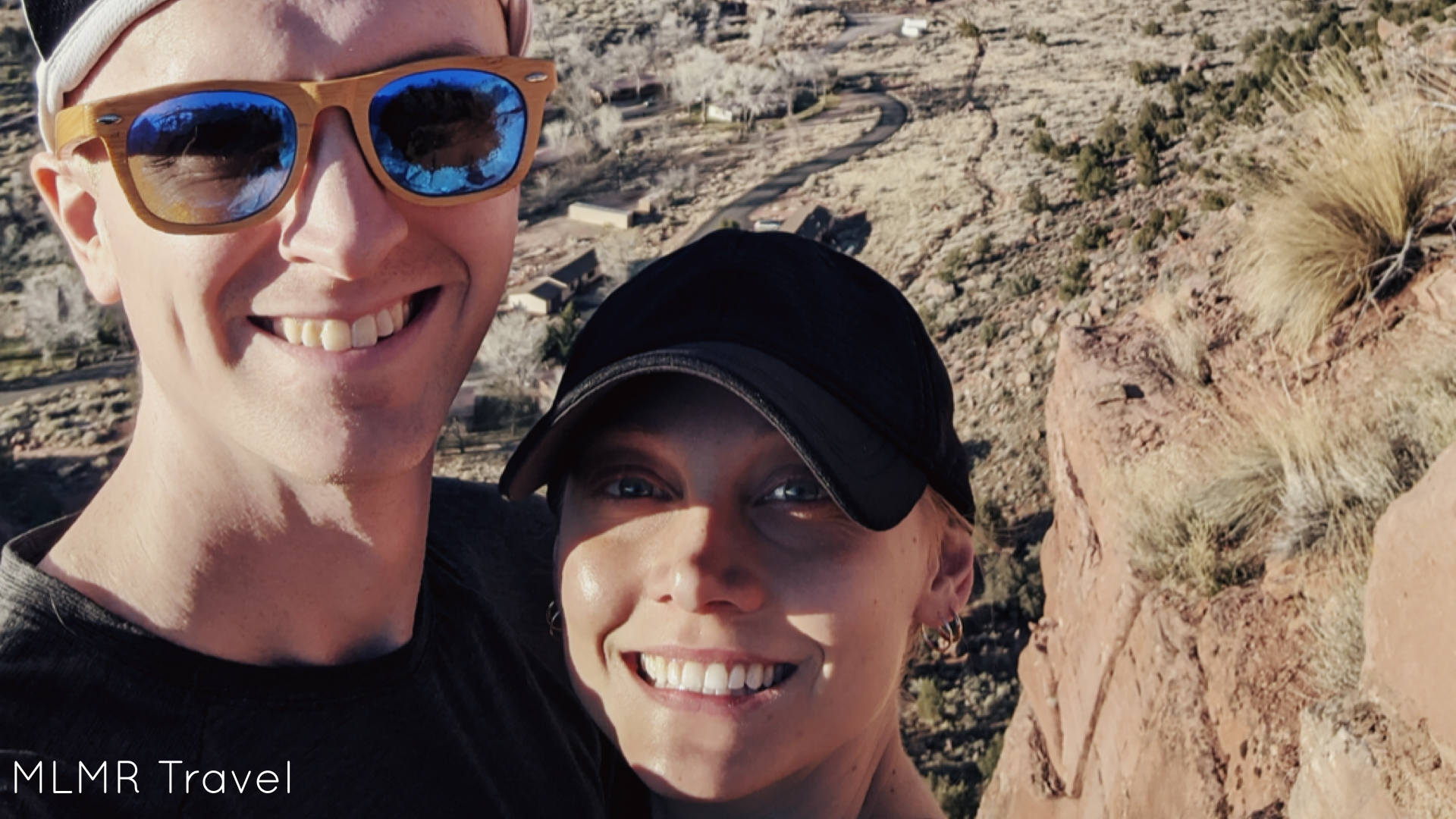
Photographer
What's traveling without taking some pictures along the way. We love having pictures to look back on and relieve our travel adventures.
Have a travel buddy means you always have someone to take your picture. Now if you want pictures together you will have to get help or get creative.
If you travel with someone you can easily divide up some of the tasks or “chores” that need to be done, making it easier on you. One person can find lodging while the other takes care of transportation.
It's important to have a travel buddy you trust for this to work out. Find a responsible travel buddy who you know will do their share. This way it's fewer tasks for everyone with the same benefits.
We feel traveling with a pair still allows you to branch out. If you decide to travel alone or with a buddy the most important thing to remember is just to go out and travel.
One Last Thing...
Since we are travel physical therapists we do have to add a little caveat about doing traveling as a pair. We probably enjoy traveling for our job because we get to do it together. Going into your first day in a new city is way less nerve-wracking with someone by your side.
The good thing with being travel physical therapists is that you don’t have to be married to travel together. You and a friend can always request your travel company to find your placements together.

Some think traveling as a pair means being less likely to meet new people and maybe taking away a chance to truly find yourself. For us, traveling together means more epic adventures.
- Next story Yosemite During the Offseason
- Previous story Incredibly Easy DIY Castile Soap Shampoo
Meet the Mindful Nomadics

We are Phil and Kelsey Schaub. A minimalist travel couple exploring the world and sharing our life adventures .
The goal is to collect moments instead of things and spend more time on the parts of life that matter .
We hope you love the site! To learn more about us, check out our mini about page here !
- To save this word, you'll need to log in. Log In
traveling companion
Definition of traveling companion
Examples of traveling companion in a sentence.
These examples are programmatically compiled from various online sources to illustrate current usage of the word 'traveling companion.' Any opinions expressed in the examples do not represent those of Merriam-Webster or its editors. Send us feedback about these examples.
Dictionary Entries Near traveling companion
traveling clock
traveling crane
Cite this Entry
“Traveling companion.” Merriam-Webster.com Dictionary , Merriam-Webster, https://www.merriam-webster.com/dictionary/traveling%20companion. Accessed 28 Apr. 2024.
Subscribe to America's largest dictionary and get thousands more definitions and advanced search—ad free!

Can you solve 4 words at once?
Word of the day.
See Definitions and Examples »
Get Word of the Day daily email!
Popular in Grammar & Usage
More commonly misspelled words, commonly misspelled words, how to use em dashes (—), en dashes (–) , and hyphens (-), absent letters that are heard anyway, how to use accents and diacritical marks, popular in wordplay, the words of the week - apr. 26, 9 superb owl words, 'gaslighting,' 'woke,' 'democracy,' and other top lookups, 10 words for lesser-known games and sports, your favorite band is in the dictionary, games & quizzes.

The Federal Register
The daily journal of the united states government, request access.
Due to aggressive automated scraping of FederalRegister.gov and eCFR.gov, programmatic access to these sites is limited to access to our extensive developer APIs.
If you are human user receiving this message, we can add your IP address to a set of IPs that can access FederalRegister.gov & eCFR.gov; complete the CAPTCHA (bot test) below and click "Request Access". This process will be necessary for each IP address you wish to access the site from, requests are valid for approximately one quarter (three months) after which the process may need to be repeated.
An official website of the United States government.
If you want to request a wider IP range, first request access for your current IP, and then use the "Site Feedback" button found in the lower left-hand side to make the request.
- Travel Advice
- Travel Insurance FAQ
Who would be considered as a "traveling companion" for my travel insurance policy?
Last Updated: February 6, 2008 April 4, 2024
The definition for a “Traveling Companion” can vary depending on the company and policy selected. Generally, a traveling companion means a person who is sharing travel arrangements with you. You should note that a group or tour leader is usually not considered a Traveling Companion unless you are sharing room accommodations with them. Always refer to your travel insurance certificate for full details and their definition.
- Host Agencies
- Accelerator Course
- Travel Jobs
- Travel Agent Chatter
- Etiquette & Rules
- Privacy Policy
What Are Travel Consortia & Travel Co-ops?
What is a travel consortium or a travel cooperative? The very very short answer that will get you through a cocktail party banter is this: A travel consortium is a collective of host agencies, travel agencies, and/or travel advisors that join forces and combine resources to increase their industry footprint including buying potential, benefits, & commission levels. We have a list of travel consortia right here for you!
SNOOZE. That’s not a very fun definition. So allow me to defer to a space analogy because space makes everything more fun.
A travel consortium is a collective of host agencies, travel agencies, and/or travel advisors that join forces and combine resources to increase their industry footprint including buying potential, benefits, & commission levels.
Imagine your agency is the star, Upsilon Carinae. When you introduce yourself at parties, you’ll probably get a lot of blank stares. But if you introduce yourself Upsilon Carinae, a part of the Milky Way , then your star acquaintances will understand more about you (without launching into a major astronomy lesson).
While stars have a heckuva lotta light, a single star may not have enough luminosity to be seen from the earth all by its lonesome. If an advisor is a star, a host agency might be like a constellation. A bunch of stars that are more identifiable together and provide more collective light than a single star. But a travel consortium is the entire galaxy—they’re the Milky Ways of the travel world.
Imagine how much more luminosity the Milky Way provides compared to a single star or even a constellation. If a star is a part of that galaxy, they get the benefit of greater visibility from all that collective light.
Ditch the Metaphor. What do Consortia & Co-ops Provide their Members?
At its most basic, a consortium helps agents and agencies with marketing, training, technologies, and supplier negotiations among other supports that would be otherwise difficult for individual advisors, agencies, and even host agencies to develop on their own. Here are a few examples:
This can include direct mailings, hosted websites for agents, social media content and so much more. If you're looking for specific marketing tools, this can help guide your decision.
Consortia technologies offered might include websites/ web templates, CRM (Customer Relations Management) systems, advisor resources websites/newsfeeds, online booking programs, and other goodies. Again, if you are looking for specific tools, this is another great way to narrow down your choices.
Training/ Education
Some consortiums may offer training opportunities including webinars and online courses, events with educational panels, or (non-required certifications (such as Travel Leaders Adventure certification).
Higher Commissions (Supplier Negotiations)
Since (most) consortia have greater aggregate buying power than an advisor, agency, or host agency, they are also able to leverage higher commissions and more amenities for their members. This is a benefit that "trickles down" to individual agents if you're part of the consortium . . . OR if you're with a host that belongs to the consortium or co-op. Allow me to elaborate.
What Doesn't a Consortium or Co-op Provide? How is it Different from a Host?
It’s probably really important to point out that a travel consortium or co-op does not provide an accreditation number. This is a biggie. So if you want to fly solo (without a host agency or franchise), you will still need to get your accreditation number even if you join a consortium.
A consortium also does not provide day-to-day back-office support, like tracking commissions and basic bookkeeping or daily reports. If you are wanting a little bit more “constant support,” a host agency might be a better option (if you’re not a part of one already).
But the good news is that most agencies do provide some of this day-to-day backend support. You can read up more on what a host agency provides here and what the difference between a franchise and a host agency is here.
Even if you are with a host agency, it’s good to know a little bit about consortia. Why? Because just about every host agency is a part of a consortia—and if a host agency belongs to that consortia, some of those benefits may pass along to you.
Should I Join a Travel Consortium? What Does it Take?
If you're hosted, it's not likely you will need to align with a travel consortium. However, if you're an independent advisor with your own travel accreditation , then aligning with a consortium is advisable.
For many consortia, members must reach a certain sales threshold among their preferred suppliers before they can join. Members are also expected to pay member dues (which will vary depending on the consortium). Consortium membership is a good fit for agents who have a travel accreditation and don’t need back-end bookkeeping support.
If you're not eligible to join a specific consortium, a good start is to choose a host that is a part of that consortium. How do you know if a host agency is a part of a consortium? Never thought you'd ask.
- Go to our consortia listings.
- Click on your consortia of choice. If you want, you can filter it!
- Look at which hosts are listed and linked at the bottom of their profile. This is a FABULOUS way to help you choose a host agency . Here's an example below:
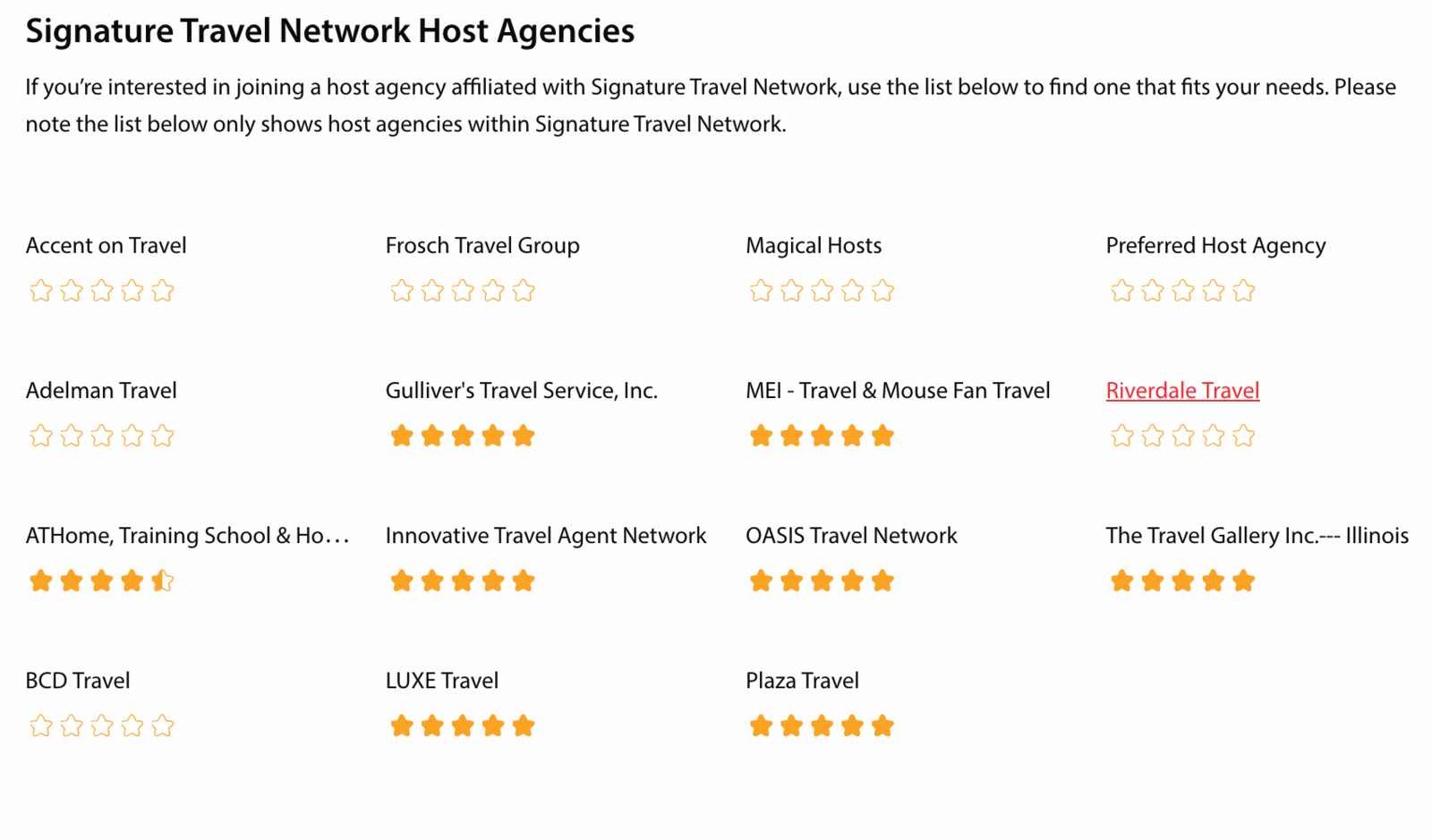
If you have fallen in love with a specific consortium but still want to be hosted, you can ask hosts how they leverage their consortia tools.
Questions to Ask a Consortium
- What are member requirements? (Sales thresholds, location requirements, etc?)
- What are membership fees?
- How many members are a part of the consortium (agency members and/or individual advisors)?
- What are their annual network sales?
- What technologies are provided?
- What training/education is provided?
- What marketing is provided?
- Do they offer a leads program or Agent Directory?
- How long has the consortium been established?
- If it's regional, what region does the consortium serve?
- Does the consortium have local or regional chapters?
- If your host agency belongs to the consortia, how do those benefits translate to the individual advisor?
- If you already belong to a host agency, what is the added value of joining a consortium?
Why Do Travel Consortia Matter to the Hosted Travel Advisor?
A question that crosses the HAR desk from time to time is, "how do consortium affiliations impact me as a hosted advisor?" This is a great question and one that Steph chatted about on Friday 15 with Vanessa McGovern from Gifted Travel Network. Here's what they had to say:
In summary? A host's consortia affiliation will have benefits that "trickle down" to the hosted advisor/ IC. A host's consortium powers a lot of the behind-the-scenes booking and marketing tools used by agencies (you) under your host agency! At the end of the day, a host's consortia affiliations can impact your marketing, access to higher commissions and amenity programs, and/or leads.
The host's affiliation with the consortium will help smaller agencies scale their business and access these tools without having to meet (oftentimes) prohibitive sales threshold as an individual (we're talking in the millions here).
A Brief Grammar Lesson Because I Literally Cannot Help Myself
I had to hand in my grammar nerd card. Why? Because as I was reviewing this article to update and republish, I noticed how many times I used the word "consortia" incorrectly. I fixed it in the update (massive cover-up, and a huge scandal for sure). But I want you to learn from my past mistakes just in case you are trying to woo a fellow grammar nerd. So here's the answer to your burning question:
When do you say "consortia" and when do you say "consortium?"
Never thought you'd ask!
- Consortium is singular: That's right, just the one.
- Consortia is plural: consortia is used to indicate multiple consortiums. *GASP!* You can also use the word consortiums, as it's interchangeable with consortia .
What, you want me to use in a sentence? You do know how to woo a grammar nerd. Here you go:
- My host agency belongs to MAST. It's a travel consortium.
- Wow! HAR has 17 consortia profiles on their list!
Have I made amends well enough to get my grammar nerd status back? I hope so.
Okay, What Now?
Are you a lone star looking to combine forces with other stars to increase your luminosity? In case you haven’t heard, Host Agency Reviews has majorly expanded. This means that consortia now have their own space (pun intended) on our website! Go check out the consortia profiles to read reviews, leave a review, and/or dig deeper into each consortium’s specific technologies, marketing support, amenities, and education that each consortium provides!
Once you get all buddy-buddy with your consortium, don't forget to leave a review of them on the site! Your experiences and insights will help other agents make smart and informed choices!
Editor's Note: This article was originally published Nov. 2nd, 2018. It was updated and republished on the publish date listed.
About the Author

Mary Stein has been working as a writer and editor for Host Agency Reviews since 2016. She loves supporting travel advisors on their entrepreneurial journey and is inspired by their passion, tenacity, and creativity. Mary is also a mom, dog lover, fiction writer, hiker, and a Great British Bake Off superfan.

- Choose a Host
- Non-host Options
- Travel Agent Basics
- Travel Industry Basics

7 Benefits Of Traveling As a Couple & How to Harness them
This post includes affiliate links. As an Amazon Associate, I earn from qualifying purchases. Full disclosure.
Are your couple travel goals all about having the most fun with your special someone? Travelling together is a great way to get to know your relationship and how you feel about that. Discover 7 secret tips that will help you to understand if you’re dating “the one”!

Almost five years on and off the road have taught me a few things about traveling with a partner. While traveling solo can be fun, there is no better feeling than a shared adventure with your loved one. There are plenty of advantages of setting off on a trip with your significant other! Keep reading to find out the seven benefits of traveling as a couple and some tips on how to make your trip together more enjoyable.

Quick Links to Post Content
It allows you to get to know your partner better
After one failed attempt at traveling together with a guy that I really liked, I started to doubt if traveling as a couple could ever work. Eventually, I said to myself: “ if a man wants a serious relationship with me, I’ll take him on a trip first before committing to the relationship “, and that’s exactly what I did.
It really is incredible how much you can learn about a person when you travel together. Even if you think you know them pretty well, as soon as you both get out of your comfort zone, you get to see every facet of the person you are with .
Being exposed to different and often uncertain or even stressful circumstances can be testing , but it can also offer precious insight into how your partner may deal with other difficulties down the road.
If the two of you manage to steer the ship successfully through stormy seas, you’ll know that you can probably make it through whatever life may throw at you!
Once I went on a trip with my boyfriend that I had been in a relationship with for a year . He seemed to be pretty chilled in life, but when our luggage did not arrive at the destination, he went totally crazy , from yelling at airport staff to offloading his frustration on me for the rest of our trip.
It was an eye-opener to me and only confirmed that going on a trip together is the best way of getting to know your partner.
Of course, not all the stories have to be like this. A few years later, I met this guy that I thought was a non-adventurous type, but he surprised me, and we ended up having the most wonderful and fun trip together. In fact, that was the beginning of a lasting relationship!

Couple travel helps you grow as an individual
Traveling as a couple helps you get to know each other and enables you to grow as an individual .
Being a highly organized person, I used to get very frustrated if things were not going entirely to plan. On one trip to Thailand, I had everything planned to military precision, down to the finest detail. Everything was going according to plan until we realized we were on the wrong island !
Instead of the serene Koh Samui, we had ended up on the neighboring Koh Pha Ngan on the night of the wild Full Moon Party !
While my instant reaction was to panic (where was I going to put my yoga mat?), my partner managed to convince me to go with the flow and adapt to the situation . Instead of yoga and meditation, we partied hard into the night and did yoga the next day (once the hangover had subsided, of course!) instead.
My partner’s calmness in even the most stressful situations taught me to let things go and adapt to changing circumstances. It is an invaluable lesson that I keep on applying in my daily life.
I also learned to listen to my partner (and other people) better and respect their needs and personal space. These are personal skills I am proud of.

Travelling together makes you more tolerant
If you think you know your partner but haven’t traveled together yet, I have some news for you: there is a lot more to learn about them . You will discover things you never knew about them, and that means good and bad !
You may find that they are prone to grumpiness when they are out of their comfort zone or that they never snored back at home, but something in the Spanish air makes them sound like a foghorn at night!
You will spend a lot of time together, so it is unavoidable that you will get frustrated and annoyed with each other, and that’s ok. You will learn what to expect from your partner under certain circumstances and how to accept their reactions to certain things. You will adjust to each other and learn how to accept each other for who you are .
If you can handle everything that happens on the road, especially if you travel for an extended period of time, your relationship is probably there for the long run .
Being an adventurous and unstoppable traveler, I never thought I’d be able to have slower traveling days until I met my current partner. At the beginning, his slower travel pace was driving me crazy, but then I learned that it can be enjoyable as a change.
Now I am happy to spend some time relaxing with him on the beach reading a book as a break from intense travel activities.

Relationship goal: creating memories together
It is always a treat to go back to your travel photos and videos a few months or even years after the trip and remember those beautiful moments you had. Sharing these photographs and memories with a partner can make them even more special .
My partner and I often spend an evening on the sofa together, looking back through our old traveling photo albums . The other night we reminisced about our trip to Thailand, where we made plenty of memories from thrilling (juggling with fire at the Full Moon Party) to romantic (boating on Koh Kut Bay while the sun set).
Some men even propose to their girlfriends during their travels (if my current partner is reading this, this isn’t a hint!). Once I saw a guy kneeling down to propose to his girlfriend on the top of the cascading waterfalls in Guatemala. When I got back to my hostel, I saw them having a candle-lit dinner on the terrace.
I couldn’t take my eyes off the happy couple, or stop thinking that it would probably be one of their most beautiful and cherished memories to share with their children!
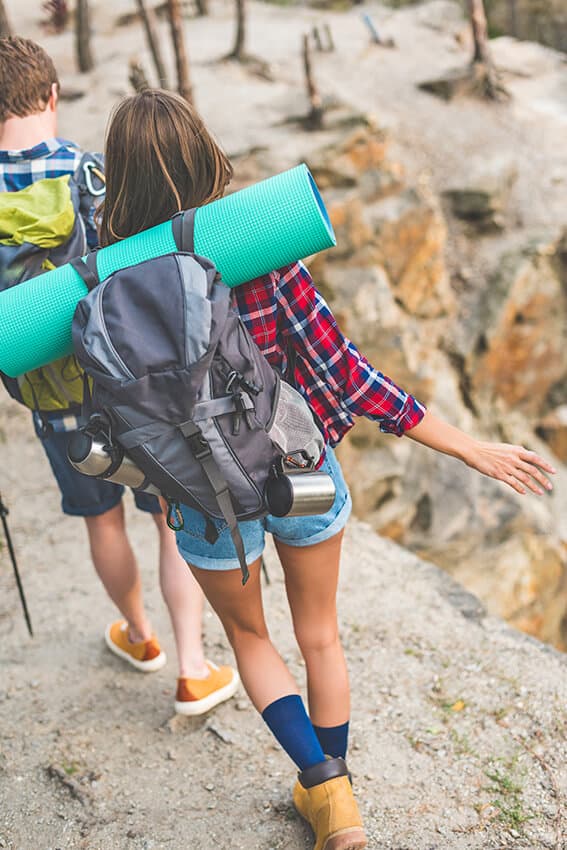
Couples traveling together step out of their comfort zone
Having a supportive partner that you trust can give you the courage to do things you would never dare to try alone!
What could be better than an encouraging partner to hold your hand when you both jump off a boat in St. Thomas for snorkeling?
I used to be terrified of swimming in the open waters, and I would have never mustered the courage to do that if not for my partner, the previously-mentioned “ non-adventurous ” man!
Not only was he patient enough to stay with me on the boat when I had an anxiety attack, but he helped me believe in myself and build the confidence to go for it. Him being by my side encouraged me to experience the most amazing thing in my life—snorkeling in the Great Barrier Reef .
As long as your partner cares about your safety and does not try to push you into doing things that are actually dangerous or reckless, having a teammate can help you overcome fears and experience incredible things.

Traveling as a couple allows you to align your life goals
When you travel with your partner, you will have plenty of time to spend with them and to share your thoughts and visions of the future.
Road tripping in Utah or experiencing a romantic gondola ride in Venice can provide an inspirational backdrop to your intimate conversations, with none of the usual daily distractions like work, childcare, or household chores.
Often it is while traveling together that you end up having the most profound conversations and connections . As well as being able to talk without distractions, you will get to see your partner’s planning , money spending , and organizational patterns .
I traveled once with an ex-partner who wanted to constantly splash out on expensive meals every night, and as a result, we had spent all of our budget less than halfway through the trip.
Another partner went to the other extreme—he was so determined to spend as little money as possible that we ended up missing out on activities and coming to regret it .
While these experiences were both frustrating, they were useful lessons that taught me that neither partner was an ideal match for me. My current partner is much more on the same page as me, and traveling with him is a blast!
Traveling can also give you ideas and inspirations that you may not have back at home . A couple of my friends even came up with a business idea during a trip and successfully implemented it after returning from their travels!
Using your time together to talk about your future and your life goals can really help the two of you to follow the same path in life.

A trip can strengthen your bond
Traveling with your partner is perhaps the best team building activity you could ever imagine. A successful trip will require a great deal of cooperation and teamwork.
If you’re the kind of couple who struggles to even wash the dishes together, this might be a challenge for you! However, planning and taking a successful trip together will prepare you for any trials that the future may hold.
Even if you run into difficulties while traveling, whether they are practical or emotional troubles, managing to overcome them can make your bond even stronger.
There is an old saying: “ the toughest steel is forged in the hottest fire “, which is often true of relationships. Once the two of you have managed to find your way back to camp after getting lost in the Australian Outback just before nightfall (yep, this happened to me!), dealing with a broken washing machine back at home will be a cinch !
There may even be times when one of you is feeling discouraged or stressed, which can provide an opportunity for the other to console and comfort them . If something goes wrong along the way and you are alone, it can be challenging to motivate yourself to see the bright side. If you are with a supportive partner, they can help you with this, and vice versa.
Experiencing the ups and downs of traveling together can make the two of you trust each other more than before. If you can provide emotional support for each other when needed, it will make your team invincible!

Tips on how to make your trip together more enjoyable
The preparation for the trip is essential, from aligning your expectations to making a packing list. Those moments when you are getting bitten by a swarm of mosquitoes because you forgot to pack a bug spray can really take away the fun of the trip (been there, done that).
- Discuss your expectations —ensure that you are on the same page before you leave.
- Prepare a packing list a few days in advance —a comfortable trip is more enjoyable. Check out this packing list for Europe for reference and to get an idea of how to keep your suitcase organized.
- Agree on the whole trip or on a daily budget —this will allow you to avoid many arguments.
- Be ready to compromise —your partner may want different things than you, and that’s OK. This is an important tip you should keep in mind also while planning your honeymoon !
- Take turns to choose activities —make sure that neither of you misses out on anything. For example there are a lot of fun things to do in Miami for couples but you should let your partner choose an adventurous day out if they want to!
- Be open to new experiences —be open-minded and treat the trip as an adventure (as it should be).
- Give each other personal space —do some activities separately to avoid friction in your relationship.
- Be encouraging, but not pushy —respect if your partner is not comfortable with certain activities.
- Check in with each other— asking if your partner is still enjoying the trip or is concerned about anything can help avoid issues before they arise.
- Take plenty of photos —this will help you capture memories that the two of you can revisit in the future. It doesn’t matter if you’re hitting all the best photography spots in London or just making weird faces at the camera. Just do it!
- Pack more socks than you think you will need —OK, this one isn’t just for couples, but it’s always good to be reminded!
I spent a lot of time traveling solo before I met my current partner, and it was not always a smooth ride. However, it helped both of us grow as individuals, and it made our relationship stronger.
If you are still wondering if it is worth setting off on that big trip with your partner, don’t hold back. The adventure awaits, so prepare well, calibrate your compasses (or GPSs), and have fun!

Travelling as a Couple – Frequently Asked Questions
Should couples travel together i’m afraid to ruin it.
We already discussed a lot above whether it’s okay or not to travel as a couple. Couples traveling together are more likely to be satisfied in their relationships.
If you are in doubt, discuss things with your partner . It will be yet another way for you to improve communication and express your feelings!
When should we consider going on a couple vacation?
Some surveys say that couples shouldn’t plan a trip together until they’ve been in a relationship for at least seven months. In our opinion that’s not true ! Only you know if it’s time and if you feel safe: follow your heart!
Is it normal for couples to go on separate vacations?
100% yes if this is what you and your partner want! Going on separate vacations is okay if you both agreed to it.

What if we break up after our vacation?
Breaking up might be hard, but if you aren’t meant for each other, it’s a good thing. Planning a trip together can bring out a lot of things we didn’t know about our partner.
If you feel like ending the relationship after your vacation, do it. You don’t need an excuse and you don’t need to justify your decision !
Is it ok to travel on my own when in a relationship?
Heck, yes! We (Dany and Al) do it often and we’ve been together for 20+ years !
A strong relationship should always be honest , loving and supportive . If traveling solo gives you the confidence and self-love you need to make your relationship work, do your thing !
Every couple is different. Some love to be by themselves, others prefer to travel with their partner. Do not compare yourselves to other couples. Just follow your heart.
Emma Jones Emma enjoys observing and exploring the world around her and writing about her discoveries. Human relationships is her favorite topic, and she likes to analyze them from a psychological perspective. She is a contributing author at Thought Catalog, GoDates , and several other media outlets.
You might also like: – How to plan a Romantic Italian Honeymoon – How to plan the Perfect Honeymoon on your own – Abruzzo Food: The Secret Italian Dishes
Pin it for later!
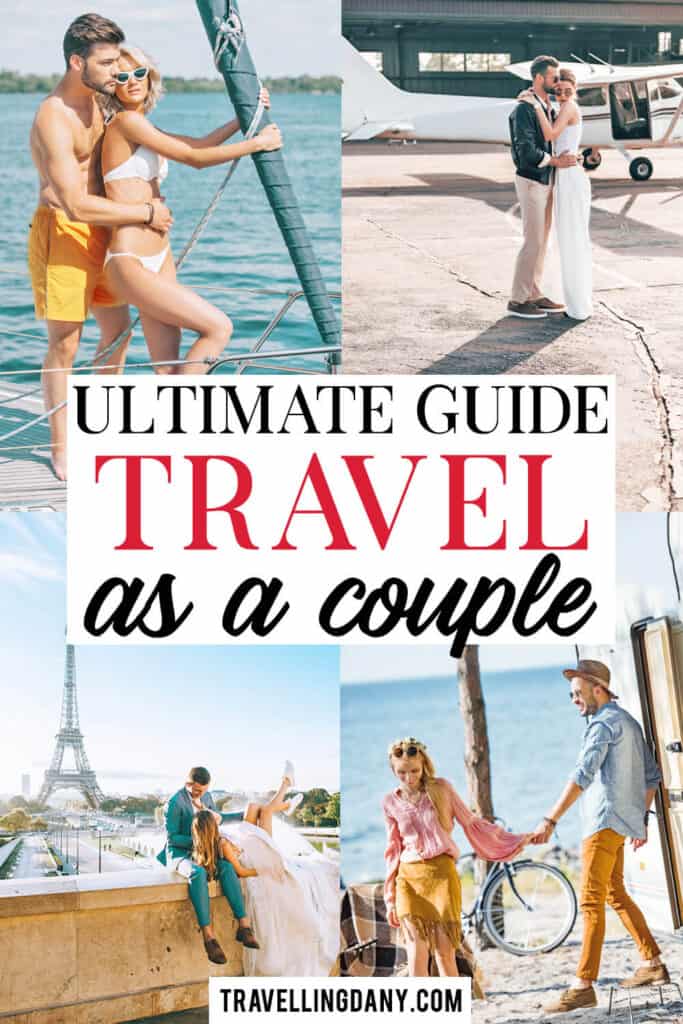
Travelling Dany – Danila Caputo
Danila Caputo is a bilingual travel writer living in between Naples and the Amalfi Coast (Italy), graduating from the University of Naples Suor Orsola Benincasa in Foreign Languages and Literature. She travels and works with her husband Aldo, photographer and videographer. Their blog chronicles their adventures around the world, their love for the USA (where they have family), Italian/European culture and tips on how to be responsible travelers. You can find out more about their latest trips and their life on Youtube, Instagram and Facebook.
Leave a Reply Cancel reply
Your email address will not be published. Required fields are marked *
It’s great that you talked about how traveling as a couple would help you get to know each other and enables you to grow an an individual. My wife and I haven’t tried going on a trip before so we are thinking of doing it next month. For that, we should probably get a romantic lodging package for the trip?
Hi Luke! A trip with your wife sounds lovely, I’m sure you’ll have a great time! But nope, I don’t think you absolutely need a romantic lodging package. I mean, of course you can treat yourself to something special. But do not feel pressured to do so! Romantic packages can be pretty expensive sometimes. So if your budget allows it, then go for it. If not, just think that travelling as a couple is important. No matter what. Do so also on a budget, but do it!
Great Post! I’ve had the same travel partner for over 45 years. We probably have experienced most of the ups and downs you describe. We are still “couple travelers” and would like to add one more benefit: We always, at the very least, learn the greetings and polite phrases used in the countries we are visiting and whose languages we don’t speak. We feel this is essential, especially, when not traveling with an organized tour – which we’ve only done once – in China and Japan!
That’s a very interesting point of view Peter! How would knowing a different language (which is always useful, not only for when you travel with your significant other!) improve your relationship?
June 1, 2020
Due to travel restrictions, plans are only available with travel dates on or after
Due to travel restrictions, plans are only available with effective start dates on or after
Ukraine; Belarus; Moldova, Republic of; North Korea, Democratic People's Rep; Russia; Israel
This is a test environment. Please proceed to AllianzTravelInsurance.com and remove all bookmarks or references to this site.

Use this tool to calculate all purchases like ski-lift passes, show tickets, or even rental equipment.

How Does Travel Insurance Cover Your Travel Companion?

Get a Quote
{{travelBanText}} {{travelBanDateFormatted}}.
{{annualTravelBanText}} {{travelBanDateFormatted}}.
If your trip involves multiple destinations, please enter the destination where you’ll be spending the most time. It is not required to list all destinations on your policy.
Age of Traveler
Ages: {{quote.travelers_ages}}
If you were referred by a travel agent, enter the ACCAM number provided by your agent.
Travel Dates
{{quote.travel_dates ? quote.travel_dates : "Departure - Return" | formatDates}}
Plan Start Date
{{quote.start_date ? quote.start_date : "Date"}}
Share this Page
- {{errorMsgSendSocialEmail}}
Your browser does not support iframes.
Popular Travel Insurance Plans
- Annual Travel Insurance
- Cruise Insurance
- Domestic Travel Insurance
- International Travel Insurance
- Rental Car Insurance
View all of our travel insurance products
Terms, conditions, and exclusions apply. Please see your plan for full details. Benefits/Coverage may vary by state, and sublimits may apply.

Insurance benefits underwritten by BCS Insurance Company (OH, Administrative Office: 2 Mid America Plaza, Suite 200, Oakbrook Terrace, IL 60181), rated “A” (Excellent) by A.M. Best Co., under BCS Form No. 52.201 series or 52.401 series, or Jefferson Insurance Company (NY, Administrative Office: 9950 Mayland Drive, Richmond, VA 23233), rated “A+” (Superior) by A.M. Best Co., under Jefferson Form No. 101-C series or 101-P series, depending on your state of residence and plan chosen. A+ (Superior) and A (Excellent) are the 2nd and 3rd highest, respectively, of A.M. Best's 13 Financial Strength Ratings. Plans only available to U.S. residents and may not be available in all jurisdictions. Allianz Global Assistance and Allianz Travel Insurance are marks of AGA Service Company dba Allianz Global Assistance or its affiliates. Allianz Travel Insurance products are distributed by Allianz Global Assistance, the licensed producer and administrator of these plans and an affiliate of Jefferson Insurance Company. The insured shall not receive any special benefit or advantage due to the affiliation between AGA Service Company and Jefferson Insurance Company. Plans include insurance benefits and assistance services. Any Non-Insurance Assistance services purchased are provided through AGA Service Company. Except as expressly provided under your plan, you are responsible for charges you incur from third parties. Contact AGA Service Company at 800-284-8300 or 9950 Mayland Drive, Richmond, VA 23233 or [email protected] .
Return To Log In
Your session has expired. We are redirecting you to our sign-in page.
- Data Protection
- Rental Bill Information
- Legal Notice
- Newsletter sign-up

Evaluating the Two-Game Road Trip in College Sports: Does a Travel Partner Scheduling Approach Affect Team Competitiveness?
Authors: Mark Mitchell, Samuel Wathen, and Robert Orwig
Corresponding Author: Mark Mitchell, DBA Professor of Marketing Associate Dean, Wall College of Business NCAA Faculty Athletics Representative (FAR) Coastal Carolina University P. O. Box 261954 Conway, SC 29528 [email protected] (843) 349-2392
Mark Mitchell , DBA is Professor of Marketing at Coastal Carolina University in Conway, SC. Samuel Wathen, PhDis Professor of Management at Coastal Carolina University in Conway, SC. Robert Orwig , DBA is Associate Professor of Management at the University of North Georgia in Dahlonega, GA.
Evaluating the Impact of Two-Game Road Trips in College Sports: Does a Travel Partner Scheduling Approach Affect Team Competitiveness?
Some NCAA athletic conferences have implemented a geographic travel partner strategy when scheduling league games. Teams are organized into two-team clusters. A visiting team comes to the region and plays both opponents during one road trip before returning to campus. Prior research reveals NBA teams tend to have a lower winning percentage when playing back-to-back games on back-to-back evenings. This study examines the performance of college sports teams on two-game road trips to see if the NBA pattern exists in college sports. Game results (and winning percentages) from the Sun Belt Conference for the 2016-17 season are evaluated over four sports (women’s soccer, women’s volleyball, women’s basketball, and men’s basketball). Team performance in Game 2 was comparable to Game 1 in women’s soccer, women’s basketball, and men’s basketball. Game 2 performance was improved in women’s volleyball. There was not a significant reduction in road team performance in Game 2 of two-game road trips when the quality of the opponent was introduced into the analysis of women’s soccer, women’s volleyball and women’s basketball. However, men’s basketball teams tended to win more often during Game 1 rather than Game 2 when playing comparable opponents. The travel partner scheduling model maximizes player rest, reduces travel time, and minimizes missed class time. This study suggests its implementation does not impact team competitiveness, particularly during Game 2 as found in the NBA. Conference personnel and university athletic administrators may take comfort that their drive to control costs and enhance the student-athlete experience is not impacting the competitiveness of their teams.
Keywords: Team winning percentages, game scheduling, travel partner scheduling, home team advantage
INTRODUCTION
Beginning with the 2018-19 season, the Colonial Athletic Association (CAA) implemented a ‘travel partner’ scheduling strategy for Women’s Basketball, pairing each team with a geographic travel partner for league games. This format allows for the scheduling of back-to-back Friday and Sunday games with both games played either at home or on the road. For example, the University of North Carolina at Wilmington played at the College of William & Mary (Williamsburg, VA) on Friday and later at Elon University (Burlington, NC) on Sunday (Washburn 2018). For the same weekend, their travel partner (The College of Charleston) played an opposite and concurrent schedule at Elon on Friday and at William & Mary on Sunday. According to Mapquest, the Elon and William & Mary are approximately 250 miles apart (5).
The Sun Belt Conference has used the travel partner scheduling format since 2015 (2). In fact, geographic proximity to an existing conference member (Appalachian State University) was an important variable in the selection of the most-recent addition to the conference (Coastal Carolina University in 2016). A press release from the Sun Belt Conference on that day outlined this geographic strategy this way (10):
With the addition of Coastal Carolina, the Sun Belt Conference will now have a symmetrical, geographic structure that is unparalleled in the history of the conference. The league will have two universities in Alabama (South Alabama and Troy), Arkansas (Arkansas State and Little Rock), Georgia (Georgia Southern and Georgia State), Louisiana (UL Lafayette and UL Monroe) and Texas (UT Arlington and Texas State) to go with Appalachian State in North Carolina and Coastal Carolina in neighboring South Carolina.
When announcing the Men’s Basketball schedule for 2016-17, Conference Commissioner Karl Benson noted (11):
“This is an exciting time for the Sun Belt Conference as we have created a membership structure that makes perfect sense with six sets of travel partners located in seven states,” Sun Belt Conference commissioner Karl Benson said. “Not only does the 12 team league allow for an 18-game regular season but it will allow for a much more manageable travel schedule for our men’s and women’s student-athletes that will result in less missed class time and much more time back on their respective campuses rather than on airplanes and buses.”
Further in the same press release (11), the conference communication notes that “each team will only travel four times for two-game road trips during the upcoming season. Travel partners will be utilized for two-game road trips throughout the conference schedule to maximize rest, minimize travel times and limit missed class time for men’s and women’s basketball student-athletes. Men’s and women’s basketball programs will each take just one, single-game road trip all season. Those single-game road trips will be for rivalry games.”
In the book “ Scorecasting: The Hidden Influences Behind How Sports are Played and Games are Won, ” authors Tobias Moskowitz and Jon Wertheim note that home teams win 62% of their games in the National Basketball Association (NBA). However, they note that not all road games are equal. Occasionally, NBA teams will play on back-to-back nights in separate cities. And, when doing so, these teams seem to be ‘a step slow.’ On average, NBA teams playing on back-to-back nights win 36% of these second-day games (for both home and away games). NBA Hall of Famer Charles Barkley referred to these second-day games as “throwaways.” He once described such games this way: “You show up because they pay you to show up. But, deep in your belly, you know you ain’t gonna win.” (6, p. 125).
For these back-to-back games, some NBA teams started resting players given their perceived competitive disadvantage. In March 2017, NBA Commissioner Adam Silver stated that the issue of resting players “is an extremely significant issue for our league” as fans complained that their favorite players were being rested on a night these fans showed up just to watch these visiting team stars play (8). For illustration, the Cleveland Cavaliers played 15 such games during that 2016-17 regular season. For these 2-city back-to-back games, the Cavaliers had a record of 5-10 (a 0.33 winning percentage). Backing out these 15 games from the team’s overall record of 51-31, we see the Cavaliers were 46-21 (a 0.69 winning percentage) in the remainder of games that provided at least one day of rest between games (1).
As illustrated above, the scheduling of back-to-back contests may affect team competitiveness, particularly during the second game of the road trip. With few exceptions (such as women’s volleyball when destinations are relatively close), college sports schedules usually allow a rest day between contents. Still, these student-athletes are ‘on the road’ which means hotels, restaurants, and being removed from their normal school routines. And, we must acknowledge the substantial differences in team travel between NBA professionals and NCAA student-athletes, particularly the presence of bus trips, non-charter air flights, and the obvious differences in hotel and restaurant accommodations.
The purpose of this manuscript is to analyze team performance on two-game road trips in one conference for a variety of sports for an entire sports season. Win-loss records will be analyzed in addition to some measure of competitive strengths of the teams. With the results, coaches and athletic administrators can formulate strategies to improve team performance or, if viewed differently, to minimize the ‘effects of the road’ on their teams.
Where possible, the Sun Belt Conference (SBC) adheres to the travel partner scheduling strategy. The twelve member schools are divided into six two-team travel partner clusters:
- Carolinas : Coastal Carolina University / Appalachian State University
- Georgia: Georgia Southern University / Georgia State University
- Alabama : Troy State University / University of South Alabama
- Louisiana : University of Louisiana Lafayette / University of Louisiana Monroe
- Arkansas: Arkansas State University / University of Arkansas Little Rock
- Texas: Texas State University / University of Texas at Arlington
As an illustration, let’s assume the Texas schools are paired with the Georgia schools for a weekend. Texas State University would play at Georgia State University on Thursday and then travel to Georgia Southern University for a Saturday game before returning to Texas. Conversely, the University of Texas Arlington would play a mirror-image schedule. That is, they would play at Georgia Southern University on Thursday and then at Georgia State University on Saturday before returning to Texas.
The earlier comments by former NBA player Charles Barkley suggest teams may not perform as well during the second game of a two-game road trip. This question will be empirically tested here. In the Sun Belt Conference, the primary sports using the two-game road trip are women’s soccer, women’s volleyball, women’s basketball, and men’s basketball. With the addition of the 12 th member school (Coastal Carolina University) for the 2016-17 season, data is available on the performance of each SBC team in its home and away conference games during the first year of full implementation. Win-loss records will be analyzed in each sport to compare performance in Game 1 versus Game 2 of each two-game road trip. Given the presence of a favored team (such as a team with a better season record to date), a measure of competitive strength of each team is added to the analysis. A Game 2 loss to a heavily-favored team differs from a Game 2 loss to an underdog (based on performance to date that season).
The Sun Belt Conference provides a longitudinal look at the results of all its sanctioned sports on its website (9). For each athletic competition, researchers can identify: Date, Home Team, Visiting Team, and Final Score. Analysis of date allows researchers to determine if the game was a single-game or part of a two-game road trip for that team. The following example pattern would be self-evident in the schedule/data: Play Thursday at Appalachian State University, Play Saturday at Coastal Carolina University. In total, we would see both single game road trips and two-game road trips. For comparison purposes, the results of both types of games are evaluated. However, the focus for this study is the two-game road trip and, specifically, team performance during the second game played.
It must be noted that the relatively small sample size (or number of observations in each cell) prohibit the use of more sophisticated statistical methods in this study. Rather, we will compare winning percentages per contest and winning percentages under certain game scenarios. Still, we believe we can make valid conclusions from the data.
The Comforts of Home (for Home Teams)
Historically, there has been some advantage to sports teams playing in their home stadiums and communities. These advantages can include: a raucous crowd of fans, a familiar environment, the lack of travel to the game destination, and other factors. Over the last 10 years, on average, home teams have won the majority their home games in the following sports (6, p. 112):
- Major League Baseball = 54%
- Major League Soccer (USA) = 69%
- NCAA College Football = 63%
- NCAA Men’s Basketball = 69%
Jamieson (3), reporting a meta-analysis of studies on home field advantage, noted that home field advantage tends to be strongest for basketball, hockey, and soccer and less for football and baseball. It should be noted that, for NCAA sports these records also include non-conference competition. In scheduling their non-conference games, some institutions choose non-peers for such games, and often provide an appearance fee for that team. For example, The Ohio State University Men’s Basketball team was 10-0 in home non-conference games in 2017 by hosting the following teams: North Carolina Central; Providence College; Western Carolina; Jackson State; Marshall; Fairleigh Dickinson; Florida Atlantic; Connecticut; Youngstown State; and UNC Asheville (12). For this reason, this study is enhanced by its focus on peer-competition (i.e., conference members) and an assumption of greater competitive parity among the participants.
Travel Partners in NCAA Sports
Recent research by the Knight Commission on Intercollegiate Athletics (4) found that athletics expenses are rising at an annual rate of approximately 7% and that revenues (from current sources) are not expanding as quickly. NCAA research (7) found spending for athletics increased 43 percent between 2004 and 2008 while revenue increased by 33% during the same period. Against this backdrop, member institutions are looking at (a) new revenue sources, and (b) sensible cost reductions. As noted earlier, scheduling two games in a geographic area can help reduce operating costs while concurrently reducing lost class time for student-athletes. Consider these two options for a team from South Carolina to play two teams in Texas or Arkansas.
- FIRST Single Game Trip: Day 1 = Fly to area; Day 2 = Game; Day 3 = Fly home.
- SECOND Single Game Trip: Day 1 = Fly back to area; Day 2 = Game; Day 3 = Fly home.
- Total Days = 6
Now, let’s assume the same team plays two games in that region or state on same road trip.
- 2-Game Road Trip: Day 1 = Fly to Area; Day 2 = Game 1; Day 3 = Bus to second site; Day 4 = Game 2; Day 5 = Fly home.
- Total Days = 5
As illustrated above, the school incurs the cost of one airfare per person to play two games. And, students miss one fewer day of class for each trip (five days as opposed to six days). Further, Watkins (14) found there was not a significant relationship between longer road trips and home court advantage in Big 12 men’s basketball. Applied to this study, this suggests a South Carolina school is not at a greater competitive disadvantage when scheduling these longer distance two-game road trips.
Conference USA, a neighboring Division I FBS Conference with 14 member schools, uses a similar pattern of scheduling with the following travel partner paired institutions:
- Florida Atlantic / Florida International
- UT El Paso, UT San Antonio
- Marshall / Western Kentucky
- UAB / Middle Tennessee State
- Rice / North Texas
- Southern Miss / LA Tech
- Charlotte / Old Dominion
The Power 5 Conferences (ACC, Big 10, Big 12, PAC 12, and SEC) tend not use this format. Other Group-of-5 conferences use selected travel partners (such as the Mountain West, Mid- American, and American Athletic) but the Sun Belt and Conference USA rely more heavily on this geographic strategy for scheduling purposes.
RESULTS AND DISCUSSION
The data was extracted from the website and input into EXCEL to track the won-loss records of the various teams and institutions. From this information, the researchers could identify the won-loss records of both HOME and VISITING teams for each contest. Independent of the strength of the opponents, the won-loss records (and winning percentages) for both HOME and VISITOR teams for each sport is provided in Table 1 (women’s soccer), Table 2 (women’s volleyball), Table 3 (women’s basketball) and Table 4 (men’s basketball). First, we see the following winning percentages for all contests:
- Women’s Soccer : Home teams win 54% of all games; visiting teams win 30% of all games; the remaining games ended in a tie.
- Women’s Volleyball : Home teams win 51% of all games; visiting teams win 49% of all games.
- Women’s Basketball : Home teams win 57% of all games; visiting team win 43% of all games.
- Men’s Basketball : Home teams win 66% of all games; visiting team win 34% of all games.
When we shift the analysis to the second game of a two-game road trip, the following summary statements are offered:
- Women’s Soccer : visiting teams won 33% of Game 1 contests and 23% of Game 2 contests.
- Women’s Volleyball : visiting teams won 42% of Game 1 contests and 53% of Game 2 contests.
- Women’s Basketball : visiting teams won 40% of Game 1 contests and 42% of Game 2 contests.
- Men’s Basketball : visiting teams won 37% of Game 1 contests and 33% of Game 2 contests.
As illustrated above and in Tables 1-4 , there was not a significant reduction in road team performance in Game 2 of two-game road trips. Game 2 outcomes for road teams were comparable in women’s soccer, women’s basketball, and men’s basketball. And, Game 2 performance (i.e., winning percentage) was improved in women’s volleyball. When a team split a road trip (i.e., one win / one loss), women’s volleyball teams showed a marked higher likelihood to win Game 2 to complete their road trip rather than winning Game 1 to start their road trip.
Analysis of Opponent Quality
Over a season of competition, a team will typically play 3 types of contents: (1) games between comparable teams – no favorite to win; (2) games where one team is slightly favored to win; and (3) games where one team is heavily favored to win. As the old saying goes, “that’s why we play the games” … these mathematical likelihoods do not always occur. Teams have unexpected wins and unexpected losses. Arguably, all teams have the potential to experience each outcome over the life of a season.
One measure of competitive parity for use is the “Final Standings in Conference Play.” This after-the-fact analysis provides a ranking of the team’s body of work over the season. From this measure, overall stronger teams can be identified and the actual outcomes of the games can be classified and evaluated. For a 12-team league, there tends to be 3 clusters of teams: (1) Upper (2) Middle, and (3) Lower. This division of teams allows for a breakdown of games into 3 clusters:
- No Clear Favorite : 2 comparable teams compete. Win, Lose, or Tie … you played a comparable opponent.
- One Slightly Favored Team : teams are 1 cluster apart (such as an UPPER playing a MIDDLE or a MIDDLE playing a LOWER).
- One Heavily Favored Team : teams are 2 clusters apart (such as an UPPER playing a LOWER).
By season’s end, the clustering of Sun Belt Conference Schools by Sport is presented in Table 5 .
The focus of this study is road team performance; specifically, road team performance in Game 2 of a two-game road trip. Using these three clusters for each sport, the researchers can determine the following outcomes for both Game 1 and Game 2 for each sport:
- How often did the VISITING TEAM win or lose to a comparable opponent?
- How often did the VISITING TEAM win or lose versus a slightly favored opponent (one cluster apart)?
- How often did the VISITING TEAM win or lose versus a heavily favored opponent (two clusters apart)?
To provide a baseline for comparison, this information is presented for each sport in Table 6 (women’s soccer), Table 7 (women’s volleyball), Table 8 (women’s basketball) and Table 9 (men’s basketball). The following summary statements are offered:
- Women’s Soccer : visiting teams tended to perform better in Game 1 than Game 2 overall all three scenarios.
- Women’s Volleyball : visiting teams tended to perform better in Game 2 than Game 1 for comparable and slightly favored teams. Further, heavily favored road teams were more often expected winners in both Games 1 and 2.
- Women’s Basketball : visiting teams tended to perform better in Game 2 when comparable teams played.
- Men’s Basketball : visiting teams tended to perform better in Game 1 than Game 2 when comparable teams played. This influence did not carry over to games where one opponent was a light or heavy favorite.
As illustrated above and in Tables 6-9 , there was not a substantial reduction in road team performance in Game 2 of two-game road trips when the quality of the opponent was introduced into the analysis in women’s soccer, women’s volleyball and women’s basketball. However, men’s basketball teams tended to win more often during Game 1 than Game 2 when playing comparable teams. When two evenly-matched teams played Game 2, the home team won 83% of the time. And, heavily-favored road teams were upset in 37% of the time (3 of 8 games) in Game 1 and 44% of the time in Game 2 (4 of 9 games). Interestingly, Sun Belt Conference men’s basketball teams scored 3.25 fewer points (on average) in Game 2 than Game 1. This is consistent with Winston’s (15) finding that NBA teams scored 4 fewer points in back-to-back games. However, only 1 of the 6 games of comparable teams was a 4-point differential in this study. So, scoring 4 more points would have only changed the outcome of one game.
CONCLUSIONS
Athletic administrators scheduling multi-game road trips for their teams may wonder if the scheduling format affects team performance and competitiveness. In this one-season analysis (2016-2017) of one conference (Sun Belt Conference), any influence of the two-game road trip format tends to be sport specific and not broad-based. Team performance in Game 2 was comparable to Game 1 in women’s soccer, women’s basketball, and men’s basketball. Game 2 performance was improved in women’s volleyball. There was not a significant reduction in road team performance in Game 2 of two-game road trips when the quality of the opponent was introduced into the analysis in women’s soccer, women’s volleyball, and women’s basketball. However, men’s basketball teams tended to win more often during Game 1 rather than Game 2 when looking playing comparable opponents.
The travel partner scheduling model maximizes player rest, reduces travel time, and minimizes missed class time. This study suggests its implementation does not impact team competitiveness, particularly during Game 2 of the road trip. As such, athletic administrators do not face a trade-off: save time and money but be lesser-competitive in the back-end of a road trip. Conference personnel and university athletic administrators may take comfort that their drive to control costs and enhance the student-athlete experience is not impacting the competitiveness of their teams.
APPLICATIONS IN SPORT
High school student-athletes are used to playing single games and returning home that evening as their leagues have a relatively small geographic footprint. Essentially, they ride a bus to a neighboring town, compete, and ride back home that evening. These same student-athletes experience increased travel demands when they enter college sports due to the expanded geographic footprint of most collegiate sport conferences. Consider the geographic footprints for the earlier referenced athletic conferences:
- Colonial Athletic Association (Massachusetts to North Carolina)
- Sun Belt Conference (South Carolina to Texas)
- Conference USA (West Virginia to Florida to Texas)
In order to reduce travel costs and missed class time, some conferences have embraced the two-game road trip with regional travel partners. As noted above, any effects of this scheduling format on team competitiveness tend to be sport-specific. Coaches and athletic administrators are looking for ways to enhance the student-athlete experience while ensuring team competitiveness within their conference. Coaches attempt to control any variable they think might give them an advantage. They may pay particular attention to the intensity of team practices, player nutrition, and player rest during road trips to guard against tired athletes during game two of a two-game road trip. A coach may attempt to ‘keep them off of their feet’ or try to rest players and conserve energy. Side travel that introduces extended periods of walking (such as a trip to a local museum or attraction) may also be minimized to conserve player energy.
It is recognized here that this research examined a single conference (Sun Belt Conference) for a single season (2016-17) across four sports. At a minimum, this study can serve as a baseline for further analysis. Power 5 or Autonomy Group Conferences (ACC, BIG 10, BIG 12, PAC 12, and SEC) may be less inclined to use the two-game road trip format for a variety of reasons, including larger travel budgets, larger distance between member schools, and others). However, other NCAA conferences (the “Group of Five” members and other mid-major conferences) face greater pressure for cost control.
The use of two-game road trips provides a cost-effective solution while concurrently reducing student-athlete time away from campus. For this analysis, the two-game road trip does not appear to introduce a systemic and significant home field advantage, particularly for Game 2 contests. Any influences tend to be sport-specific. The feared cost/benefit trade-off of ‘saving money’ versus ‘being competitive on the road’ is not prevalent in this analysis. Conference personnel and university athletic administrators may take comfort in their drive to control costs that they are not diminishing the competitiveness of their teams.
- Basketball Reference (2019). 2016-17 Cleveland Cavaliers schedule and results. Retrieved from: https://www.basketball-reference.com/teams/CLE/2017_games.html
- Crandon, T. (2015). Sun Belt to implement travel partners for 2015-16 schedule. The Shorthorn . Retrieved from: http://www.theshorthorn.com/sports/men_basketball/sun-belt-to-implement-travel-partners-for—schedule/article_ce78e114-eae2-11e4-b847-3b59f1cdf185.html
- Jamieson, J. (2010). The home field advantage in athletics: A meta-analysis. Journal of Applied Social Psychology , 40, 7, 1819-1848.
- Knight Commission on Intercollegiate Athletics (2014). College sports 101. Retrieved from: http://www.knightcommission.org/collegesports101/table-of-contents
- Mapquest (2019). www.mapquest.com
- Moskowitz, T. and Wertheim, L. J. (2011). Scorecasting: The hidden influences behind how sports are played and games are won. New York: Three Rivers Press.
- National Collegiate Athletics Association (2009). 2004-06 NCAA revenues and expenses of division I intercollegiate athletics programs report. Retrieved from: http://www.ncaapublications.com/productdownloads/RE2008.pdf
- Shelburne, R. (2017). Adam Silver: Resting star players ‘a significant issue for the league. ESPN online . Retrieved from: http://www.espn.com/nba/story/_/id/18962901/resting-star-players-significant-issue-league
- Sun Belt Conference Website (2019). www.sunbeltsports.org
- Sun Belt Conference (2016a). Coastal Carolina officially joins the Sun Belt. Retrieved from: http://sunbeltsports.org/news/2016/6/30/BB_0630163323.aspx?path=general
- Sun Belt Conference (2016b). Sun Belt Conference announces 2016-17 men’s and women’s basketball conference schedules. Retrieved from: http://www.goccusports.com/sports/m-baskbl/spec-rel/042816aac.html
- The Ohio State University Athletics Website (2017), http://www.ohiostatebuckeyes.com/ .
- Washburn, R. (2018). CAA announces 2018-19 women’s basketball conference schedule. Retrieved from: https://caasports.com/news/2018/7/1/caa-announces-2018-19-womens-basketball-conference-schedule.aspx
- Watkins, P. (2013). Revisiting the home course advantage in college basketball. The International Journal of Sport and Society , 3, 33-42.
- Winston, W. (2009). Mathletics: How gamblers, managers, and sports enthusiasts use mathematics in baseball, football, and basketball . Princeton and Oxford: Princeton University Press.

Share this:
Share this article, choose your platform.
- Dictionary Home
- Recently Added
- Terms of Use
- Privacy Policy
Define Travel Partner
travel partner. A travel supplier that participates in a frequency marketing program operated by another travel supplier.
To find the abbreviation, acronym, or term you’re looking for, use the Search box (below) or click on any letter (above).
This site is Copyright© 1999-2022. All rights reserved.
Serving the travel industry since 1999
Carnegie Mellon University | Privacy Policy

IMAGES
VIDEO
COMMENTS
Traveling with a compatible partner can make your journey more enjoyable and memorable. To ensure a successful journey, it is essential to discuss and agree on travel goals, preferences, and expectations. This involves communicating openly about your interests, budgets, and travel styles. 1. Define your travel goals.
Travel is all about teamwork when you travel with others. 5. Consideration and Compromise. No matter how close of friends you may be with your travel companion, you will have differences of opinion on things during the trip. How you handle it is essential to make for a great time on vacation.
There are safe ways to find a travel partner for a day, a week, or more. These methods give you the freedom of being solo and connecting to interesting people when you want. 1. Get a warm introduction from a friend. One of the best ways to find a travel companion is through a friend or family member. Being concerned for your safety, they will ...
Trying local delicacies is a big part of every culture, and new experiences that get you out of your comfort zone are what great memories are made of. Find a travel companion that isn't afraid to try something new, even if it's just once! 6. Make sure their energy level vibes with yours.
A travel companion is someone who either travels with you or meets you at your destination, to share in the experience together. It's certainly more fun to sight-see or have romantic dinner dates with a travel buddy than to travel or dine alone! Travel companions are simply just that - people traveling together. In essence, travel companions are individuals journeying together, fitting the ...
Nanny. A nanny who works as a traveling companion ensures the safety of the children throughout their travels. A family can choose the level of engagement that a traveling nanny has with their family, depending on the family's childcare requirements. For example, a family may only require their nanny to work a certain number of hours per week ...
5. Travello. Travello is a free app ( iOS / Android) that allows you to search through other travelers' profiles and look for people who want to do the same things as you. The company calls itself a social media site for travelers, so it's perfect for anyone trying to travel with a buddy.
There are a few other things that can make choosing a travel partner easier. Chat with any potential travel buddies to be clear on where you're going and what you want to see. Make sure everyone knows of any can't miss destinations/sites on your trip, and let everyone get a say in planning the trip. You don't want to end up with ...
Partnerships are what enable many travel companies to grow. By sharing with others, hotel companies, airlines, cruise lines, destinations and car rental companies can direct resources and capabilities to revenue improvement projects and growth ambitions. At Connect Worldwide, we believe that meaningful partnerships are the foundation for success.
Since we're married we sort of travel together by default but that doesn't take away from the fact that there are many benefits to having a travel partner. Turns out adventures can be even greater when you have someone you can travel the world with. Your travel buddy does not have to be a romantic relationship. It simply means a companion ...
A travel consultant uses their expert knowledge to arrange and make reservations for flights, hotel stays, travel excursions, and holiday packages. They speak with contacts at properties across the globe to help customise clients' vacations to their needs. They recommend restaurants, sightseeing destinations, and may arrange travel discounts.
The meaning of TRAVELING COMPANION is a person who goes with someone who is traveling somewhere.
One commenter requested a minor editorial change in section 300-3.1 in the revised definition for "Domestic Partner", noting that the parenthetical "or foreign country" is not used in the term "Domestic Partnership". ... thus extending travel and relocation benefits to partners in all relationships. GSA is not abolishing already ...
Generally, a traveling companion means a person who is sharing travel arrangements with you. You should note that a group or tour leader is usually not considered a Traveling Companion unless you are sharing room accommodations with them. Always refer to your travel insurance certificate for full details and their definition. The definition for ...
A travel consortium is a collective of host agencies, travel agencies, and/or travel advisors that join forces and combine resources to increase their industry footprint including buying potential, benefits, & commission levels. Imagine your agency is the star, Upsilon Carinae.
Couple travel helps you grow as an individual. Traveling as a couple helps you get to know each other and enables you to grow as an individual. Being a highly organized person, I used to get very frustrated if things were not going entirely to plan. On one trip to Thailand, I had everything planned to military precision, down to the finest ...
That's not the case — although travel insurance does provide some benefits that can affect companions. Allianz Global Assistance defines a travel companion as "a person traveling with you whose name appears with yours on the same trip arrangement and who will accompany you on your trip." (A group or tour leader doesn't count, unless ...
AVIS TRAVEL PARTNER. Make the most of your journey with help and advice from Avis Travel Partner. Wherever you're heading, we'll help you stay on. top of your journey. We provide assistance and support - and our dedicated representatives are on hand 24/7 over the phone or on email.
For the same weekend, their travel partner (The College of Charleston) played an opposite and concurrent schedule at Elon on Friday and at William & Mary on Sunday. According to Mapquest, the Elon and William & Mary are approximately 250 miles apart (5). The Sun Belt Conference has used the travel partner scheduling format since 2015 (2).
travel partners translation in English - English Reverso dictionary, see also 'travel agency, travel agent, trave, traveler', examples, definition, conjugation
travel partner. A travel supplier that participates in a frequency marketing program operated by another travel supplier. To find the abbreviation, acronym, or term you're looking for, use the Search box (below) or click on any letter (above). A definition of travel partner as used in the travel industry.
Lexeme: travel partner Inferred. Definition: noun. A travel partner is someone who accompanies you on your trips or vacations. They can be a friend, romantic partner, family member, or even a fellow traveler you meet along the way. Travel partners can share the planning and decision-making process, offer companionship and support during the journey, and help create memorable experiences together.
Travel Partner. definition. Travel Partner means any IST partner who offers to organize all or part of a Beneficiary's travel in order to attend a Training Course. Travel Partner. - means a travel agency that makes bookings for air travel and other ancillary services for IndiaOne Air flights.